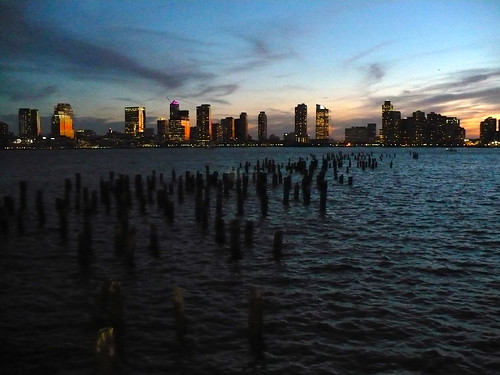Down the block from Linda’s home, there was a cemetery. Its southern gate faced her street and stayed open daily until dusk. On afternoons when Linda’s mother lay down with one of her headaches, Linda took a sketchbook to the graves.
It lifted off from a chair-back,
Beating a smooth course for the right window
And clearing the sill of the world.
- Richard Wilbur, "The Writer"
Tuesday, December 8, 2015
Short Story: When Linda Sketched the Dead
Halfway Down the Stairs published one of my short stories last week. The link to it is here. The opening paragraph:
Labels:
childhood,
death,
fear,
my writing,
short stories,
writing
Thursday, November 19, 2015
Week in Seven Words #272
fixation
"What we lack is TRUTH and COURAGE!" she cries. (Her friend's reply is a low murmur.) "No, NO!" she cuts in. "COURAGE! We have no COURAGE!" (Her friend continues murmuring.) "Nothing can get done without COURAGE!"
girding
Along with packing for the trip, I need to prepare psychologically. I know there will be tension, anger and irrational arguments. Lingering grief too.
nourished
They sit cross-legged on the picnic table beneath the maple and feed each other pizza.
one-sided
It's difficult talking to people who are always so certain. They like to give me a knowing, pitying look, like they've got it all figured out and they're just waiting for me to come around, any minute now, to their way of seeing things.
released
I attach the file, send the email, and hope for an outcome that isn't terrible.
unaccustomed
When he sits by the shelves with his son on his lap and reads from the picture book, he sounds the words carefully. He looks puzzled at the bright children bouncing through the American city from page to page.
well-reasoned
"I don't like losing," he says, as the centerpiece of his argument for why I should lose to him.
"What we lack is TRUTH and COURAGE!" she cries. (Her friend's reply is a low murmur.) "No, NO!" she cuts in. "COURAGE! We have no COURAGE!" (Her friend continues murmuring.) "Nothing can get done without COURAGE!"
girding
Along with packing for the trip, I need to prepare psychologically. I know there will be tension, anger and irrational arguments. Lingering grief too.
nourished
They sit cross-legged on the picnic table beneath the maple and feed each other pizza.
one-sided
It's difficult talking to people who are always so certain. They like to give me a knowing, pitying look, like they've got it all figured out and they're just waiting for me to come around, any minute now, to their way of seeing things.
released
I attach the file, send the email, and hope for an outcome that isn't terrible.
unaccustomed
When he sits by the shelves with his son on his lap and reads from the picture book, he sounds the words carefully. He looks puzzled at the bright children bouncing through the American city from page to page.
well-reasoned
"I don't like losing," he says, as the centerpiece of his argument for why I should lose to him.
Sunday, November 15, 2015
Dancer Taking in Paris
Earlier this year, the Opéra National de Paris YouTube channel posted short videos directed by Benjamin Millepied. They feature different dancers from the Paris Opera Ballet. This one focuses on Dorothée Gilbert and, all around her, Paris.
Friday, November 13, 2015
13 More Short Stories for Friday the 13th
Like I said the first time I posted a Friday the 13th short story round-up, I don't believe in the superstition of the day. But I'd like to share stories I've read that have some combination of dread, distorted thoughts, strange phenomena and/or horror.
Title: A Diorama of the Infernal Regions, or the Devil’s Ninth Question
Author: Andy Duncan
Where I Read It: Fantasy: The Best of the Year 2008
This coming of age story, set in the 19th century American South, reads like the set-up to a novel, or maybe a computer game; but it feels complete too. The main character, Pearleen Sunday, was dumped as a baby on the doorstep of an unscholarly museum. It's run by a man who likes to use magic tricks, sex, tall tales, and eye-catching visuals to draw a crowd. As she's growing up, Pearleen has a variety of chores, like working the diorama of the infernal regions - a huge moving strip of canvas that depicts all kinds of hellish torture to museum visitors. But whenever she stands behind it, cranking it into motion, Pearleen sees different images from what appears to be another world.
One day, a visiting magician, Farethewell, needs a last-minute replacement for a young female assistant in his magic show. When he asks Pearleen to step in, and she sees the humiliation in store for her, she flees and leaps into the back of the diorama, which leads her to the ghost-filled mansion of an old widow, Mrs. Winchester. And though she isn't in the infernal regions as depicted by the diorama, Pearleen will still meet the devil's son-in-law.
Pearleen chooses between a coming of age experience that would turn her into a sex object and one where she discovers where she might belong and what her powers could be. It's an odd adventure and hints at more to come.
Title: A Diorama of the Infernal Regions, or the Devil’s Ninth Question
Author: Andy Duncan
Where I Read It: Fantasy: The Best of the Year 2008
This coming of age story, set in the 19th century American South, reads like the set-up to a novel, or maybe a computer game; but it feels complete too. The main character, Pearleen Sunday, was dumped as a baby on the doorstep of an unscholarly museum. It's run by a man who likes to use magic tricks, sex, tall tales, and eye-catching visuals to draw a crowd. As she's growing up, Pearleen has a variety of chores, like working the diorama of the infernal regions - a huge moving strip of canvas that depicts all kinds of hellish torture to museum visitors. But whenever she stands behind it, cranking it into motion, Pearleen sees different images from what appears to be another world.
One day, a visiting magician, Farethewell, needs a last-minute replacement for a young female assistant in his magic show. When he asks Pearleen to step in, and she sees the humiliation in store for her, she flees and leaps into the back of the diorama, which leads her to the ghost-filled mansion of an old widow, Mrs. Winchester. And though she isn't in the infernal regions as depicted by the diorama, Pearleen will still meet the devil's son-in-law.
Pearleen chooses between a coming of age experience that would turn her into a sex object and one where she discovers where she might belong and what her powers could be. It's an odd adventure and hints at more to come.
Thursday, November 12, 2015
Week in Seven Words #271
cultivated
Three ladies leafing through books in a room hung with tapestries.
delivery
A rattling cart, laden with aluminum trays of warm fragrant meat.
getaway
The only splash of color in the office comes from a banner with a beach scene: sunset, gold sand, palms imprinted on curling waves.
muted
Without the usual roar from the TV, there's a startling quiet in the house.
overcompensating
His know-it-all attitude masks a fear of the world and an uncertainty about his place in it.
treacherous
Dinner isn't so much a minefield as a sea dotted with icebergs. What's above the surface is dangerous enough; below, there are contours and formations we can't bear to think about.
upgrade
"Our online system works well. People can find things easily and save their search results reliably. Clearly we're doing something wrong."
Three ladies leafing through books in a room hung with tapestries.
delivery
A rattling cart, laden with aluminum trays of warm fragrant meat.
getaway
The only splash of color in the office comes from a banner with a beach scene: sunset, gold sand, palms imprinted on curling waves.
muted
Without the usual roar from the TV, there's a startling quiet in the house.
overcompensating
His know-it-all attitude masks a fear of the world and an uncertainty about his place in it.
treacherous
Dinner isn't so much a minefield as a sea dotted with icebergs. What's above the surface is dangerous enough; below, there are contours and formations we can't bear to think about.
upgrade
"Our online system works well. People can find things easily and save their search results reliably. Clearly we're doing something wrong."
Labels:
beach,
books,
conversation,
decisions,
food,
meals,
psychology,
T.V.,
week in seven words
Tuesday, November 10, 2015
Veterans Day Viewing: Debt of Honor
Title: Debt of Honor: Disabled Veterans in American History
Director: Ric Burns
Language: English
Rating: PG
I watched a free screening last night for a documentary that will be airing on PBS tonight, 11/10, at 9 p.m. eastern time. Debt of Honor looks at the way the U.S. has responded to returning wounded veterans from major wars across history.
With advances in medicine and technology, there are many more people who survive serious injuries in the line of duty, but they might return with missing limbs, paralysis or with visible scars. These permanent injuries are among the challenges to returning to civilian life.
The documentary also focuses on mental health, particularly post-traumatic stress, in returning veterans. As far as we can tell, mental trauma has always been a part of war, with different names for post-traumatic stress ("soldier's heart" after the Civil War, "shellshock" after WWI), and our understanding of it increased greatly after the Vietnam War. But there's still much that we don't understand and a stigma remains. Often, it's the psychological issues (including but not limited to PTSD) that keep returning troops from merging back into daily life successfully. It's also a matter of redefining or readjusting their identity after spending time in a combat zone or military setting. And if they're injured or mentally traumatized, they need to find a way to make sense of life.
General attitudes have also varied, from one war to another, towards returning veterans and how to respond to those injured; and the documentary makes the point that since Vietnam, the military and the mainstream population have gone separate ways. There's a disconnect between them. We don't have a draft. Civilians may not even really feel any direct effects of war, and may live in ignorance of complex battles fought in places they wouldn't be able to find on a map. So when soldiers return, it might as well be from an alien world. Meantime, there are high rates of suicide among veterans and soldiers in active duty.
The film is well worth watching, so if you have time tonight and have access to PBS please check it out (or get the DVD at some other point). After the screening last night, there was a discussion panel that covered several topics, including inadequate care for veterans. For instance, Guam has a super-high rate of U.S. military service, but it's terribly short on VA resources. (Here's a short video on that.)
Director: Ric Burns
Language: English
Rating: PG
I watched a free screening last night for a documentary that will be airing on PBS tonight, 11/10, at 9 p.m. eastern time. Debt of Honor looks at the way the U.S. has responded to returning wounded veterans from major wars across history.
With advances in medicine and technology, there are many more people who survive serious injuries in the line of duty, but they might return with missing limbs, paralysis or with visible scars. These permanent injuries are among the challenges to returning to civilian life.
The documentary also focuses on mental health, particularly post-traumatic stress, in returning veterans. As far as we can tell, mental trauma has always been a part of war, with different names for post-traumatic stress ("soldier's heart" after the Civil War, "shellshock" after WWI), and our understanding of it increased greatly after the Vietnam War. But there's still much that we don't understand and a stigma remains. Often, it's the psychological issues (including but not limited to PTSD) that keep returning troops from merging back into daily life successfully. It's also a matter of redefining or readjusting their identity after spending time in a combat zone or military setting. And if they're injured or mentally traumatized, they need to find a way to make sense of life.
General attitudes have also varied, from one war to another, towards returning veterans and how to respond to those injured; and the documentary makes the point that since Vietnam, the military and the mainstream population have gone separate ways. There's a disconnect between them. We don't have a draft. Civilians may not even really feel any direct effects of war, and may live in ignorance of complex battles fought in places they wouldn't be able to find on a map. So when soldiers return, it might as well be from an alien world. Meantime, there are high rates of suicide among veterans and soldiers in active duty.
The film is well worth watching, so if you have time tonight and have access to PBS please check it out (or get the DVD at some other point). After the screening last night, there was a discussion panel that covered several topics, including inadequate care for veterans. For instance, Guam has a super-high rate of U.S. military service, but it's terribly short on VA resources. (Here's a short video on that.)
Labels:
documentary,
health,
mental health,
military,
movies,
veterans,
war,
worth watching
Sunday, November 8, 2015
Week in Seven Words #270
cradling
Held in place by the people around her, she falls asleep standing up in the subway car.
enthused
Flowers spilling out of the grocery store to meet the warmer air.
frenzied
We have a short time together. Make it count, I think. Tell funny stories, crack jokes. But I can't think of anything. My need to perform is proof of the distance between us. I can only wave and gesture and pull faces like a clown; anything more subtle won't get noticed.
glaring
Coffee in a solarium. He wishes he could smoke indoors too. He takes out his lighter and turns it in different angles until a blade of sunlight springs out of it.
intrusive
Fog probing the upper reaches of the tree.
unaccountable
It's hideous when parents turn one of their children into the brutal enforcement arm of their parental power. The child dispenses punishment - berates the other children, bullies and hits them. The parents watch calmly from their heights.
wreckage
The fire station has fallen apart. A truck and a police car have smashed into the pizzeria. Mermaids bob in the harbor next to capsized boats. The future of Lego City looks grim.
Held in place by the people around her, she falls asleep standing up in the subway car.
enthused
Flowers spilling out of the grocery store to meet the warmer air.
frenzied
We have a short time together. Make it count, I think. Tell funny stories, crack jokes. But I can't think of anything. My need to perform is proof of the distance between us. I can only wave and gesture and pull faces like a clown; anything more subtle won't get noticed.
glaring
Coffee in a solarium. He wishes he could smoke indoors too. He takes out his lighter and turns it in different angles until a blade of sunlight springs out of it.
intrusive
Fog probing the upper reaches of the tree.
unaccountable
It's hideous when parents turn one of their children into the brutal enforcement arm of their parental power. The child dispenses punishment - berates the other children, bullies and hits them. The parents watch calmly from their heights.
wreckage
The fire station has fallen apart. A truck and a police car have smashed into the pizzeria. Mermaids bob in the harbor next to capsized boats. The future of Lego City looks grim.
Thursday, November 5, 2015
10 reasons to watch Double Indemnity (1944)
Title: Double Indemnity
Director: Billy Wilder
Language: English
Rating: Unrated
Walter Neff (Fred MacMurray) is an insurance salesman who helps Phyllis Dietrichson (Barbara Stanwyck) kill her husband in a way that will increase the life insurance payout.
Walter's friend and colleague, claims adjuster Barton Keyes (Edward G. Robinson), begins to suspect that Mr. Dietrichson's death wasn't an accident.
Why is Double Indemnity worth watching?
Director: Billy Wilder
Language: English
Rating: Unrated
Walter Neff (Fred MacMurray) is an insurance salesman who helps Phyllis Dietrichson (Barbara Stanwyck) kill her husband in a way that will increase the life insurance payout.
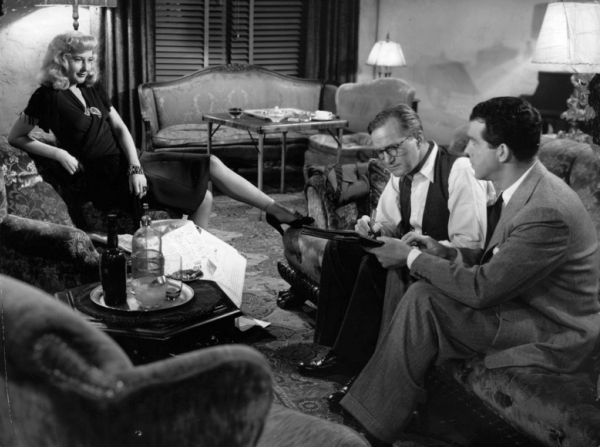
"Double Indemnity, Life Magazine" Licensed under Public Domain via Commons.
Walter's friend and colleague, claims adjuster Barton Keyes (Edward G. Robinson), begins to suspect that Mr. Dietrichson's death wasn't an accident.
Why is Double Indemnity worth watching?
Tuesday, November 3, 2015
Week in Seven Words #269
abeyance
Winter is still on the gardens. The paths are empty, the domes and crenellated walls deserted. Everywhere there's a cold, fuzzy silence.
claimed
Geese have claimed the soccer fields, the gazebo by the river. Branches have fallen across the path that feeds into the deep woods. By a gap in the fence, a hole has opened up in the earth and filled with gray water.
confined
Restless people pace inside the mansion, their fingers tracing walnut furniture. Before each window they stop to study the river. They wish they could leap out of their skin and race to the water. Maybe one day. They turn from each window and take up pacing.
crammed
PowerPoint slides frustrate him. They're too small for what he needs to say. His words and numbers run on, in ever tinier fonts, as he fills the available space.
edible
Homes with cream trimming, cherry-colored shutters.
gutted
Even when she talks about a triumph, her voice wavers with pain. She can't believe in her own success. She's convinced that she succeeded only by chance.
percolating
The coffee pours warmth into chilled wet feet and fingers nipped with cold.
Winter is still on the gardens. The paths are empty, the domes and crenellated walls deserted. Everywhere there's a cold, fuzzy silence.
claimed
Geese have claimed the soccer fields, the gazebo by the river. Branches have fallen across the path that feeds into the deep woods. By a gap in the fence, a hole has opened up in the earth and filled with gray water.
confined
Restless people pace inside the mansion, their fingers tracing walnut furniture. Before each window they stop to study the river. They wish they could leap out of their skin and race to the water. Maybe one day. They turn from each window and take up pacing.
crammed
PowerPoint slides frustrate him. They're too small for what he needs to say. His words and numbers run on, in ever tinier fonts, as he fills the available space.
edible
Homes with cream trimming, cherry-colored shutters.
gutted
Even when she talks about a triumph, her voice wavers with pain. She can't believe in her own success. She's convinced that she succeeded only by chance.
percolating
The coffee pours warmth into chilled wet feet and fingers nipped with cold.
Labels:
birds,
confidence,
drink,
houses,
pain,
PowerPoint,
restlessness,
seasons,
self-worth,
trees,
warmth,
week in seven words,
winter
Sunday, November 1, 2015
NYC Marathon: Music Video and Some Route Photos
The 2015 New York City Marathon is currently underway. Am I participating? No. Do I care who wins? Also no. But I'm using it as an excuse to post a music video of a singer I like:
Imelda May (I've shared some of her music before). The guy running through the video here is Al Gare, double bass and bass guitar player for her band.
Also, the last Sunday of September I walked the Brooklyn and Queens segments of the marathon route, which takes you through different neighborhoods, each with its own flavor. So I'll share some of those photos here.
Imelda May (I've shared some of her music before). The guy running through the video here is Al Gare, double bass and bass guitar player for her band.
Also, the last Sunday of September I walked the Brooklyn and Queens segments of the marathon route, which takes you through different neighborhoods, each with its own flavor. So I'll share some of those photos here.
Labels:
art,
Brooklyn,
buildings,
cars,
holidays,
Judaism,
music,
New York City,
photography,
photos (mine),
Queens,
songs,
video,
walks
Friday, October 30, 2015
Week in Seven Words #268
cantankerous
The dark building scowls at the street, its face scarred by scaffolding. The names by each mailbox are peeling off like scabs.
lazing
I'm tired of the expression "politically correct." It's become a knee-jerk criticism, a shortcut in thought.
liberated
Half of the fence has collapsed towards the house, the other half towards the lawn. An evergreen shrub has thrust itself into the gap.
ribbing
A broken umbrella tumbles between the cars, tickling them as it goes.
smirking
Another expression I'm tired of - more than tired of, I'd like to pulverize it with my fists - is "good intentions." It's an excuse, a deflection, a pat on the back. A false innocence, a willful ignorance.
unattainable
Some people show you a love like the horizon. It'll be yours, they say, if you keep struggling towards it, on land, by sea, with everything in you. One day you'll have their love. Just make an effort. A real effort. Break yourself on the dream of it.
unshackled
Behind a restaurant, a waiter puts out his cigarette and break dances. Pigeons rocket away.
The dark building scowls at the street, its face scarred by scaffolding. The names by each mailbox are peeling off like scabs.
lazing
I'm tired of the expression "politically correct." It's become a knee-jerk criticism, a shortcut in thought.
liberated
Half of the fence has collapsed towards the house, the other half towards the lawn. An evergreen shrub has thrust itself into the gap.
ribbing
A broken umbrella tumbles between the cars, tickling them as it goes.
smirking
Another expression I'm tired of - more than tired of, I'd like to pulverize it with my fists - is "good intentions." It's an excuse, a deflection, a pat on the back. A false innocence, a willful ignorance.
unattainable
Some people show you a love like the horizon. It'll be yours, they say, if you keep struggling towards it, on land, by sea, with everything in you. One day you'll have their love. Just make an effort. A real effort. Break yourself on the dream of it.
unshackled
Behind a restaurant, a waiter puts out his cigarette and break dances. Pigeons rocket away.
Labels:
abuse,
buildings,
dance,
love,
pain,
plants,
psychology,
relationships,
week in seven words
Tuesday, October 27, 2015
Awesome Autumn Hike: Sleepy Hollow and Rockfeller State Park Preserve

I went on a fantastic 13-mile hike this past Sunday with Shorewalkers through Sleepy Hollow and Rockefeller State Park Preserve.
The foliage looked like it was at its peak; the weather was mild, with the day starting off a little drizzly, then gray and finally sunny in the afternoon. It was brilliant.
The hike started at the Philipse Manor train station on the Hudson Line of the Metro North Railroad; it's about an hour north of New York City's Grand Central Station by train. First we walked a few blocks through Sleepy Hollow, a quiet suburb with lovely homes half-buried in autumn colors.

Labels:
leaves,
nature,
parks,
photography,
photos (mine),
seasons,
short stories,
trees,
walks,
water
Monday, October 26, 2015
Week in Seven Words #267
aging
White linens folded in a pile. Beside it, a vase of brown roses.
defaced
Long scars on a lone tree. It looks like it's been whipped.
ferreting
On all fours, her nose to the floor, she searches for candy among people's feet.
flatness
The kid flops onto the floor. He stares at the ceiling, then rolls over onto his stomach. Thunks his forehead against the carpet a couple of times, rolls onto his back, and kicks his heel against the wall. "Ow," he says, and kicks the wall again. Any sensation is preferable to boredom.
fluorescent
Lime green graffiti lighting up a street soaked in rain.
tippy
An old man pedaling a bike, leaning into it. It's a purple bike, and he wears a Panama hat and black sandals. He shifts a toothpick from one side of his mouth to the other. The front wheel of the bike jerks left and right.
token
A barren nest tucked in a tree hollow.
White linens folded in a pile. Beside it, a vase of brown roses.
defaced
Long scars on a lone tree. It looks like it's been whipped.
ferreting
On all fours, her nose to the floor, she searches for candy among people's feet.
flatness
The kid flops onto the floor. He stares at the ceiling, then rolls over onto his stomach. Thunks his forehead against the carpet a couple of times, rolls onto his back, and kicks his heel against the wall. "Ow," he says, and kicks the wall again. Any sensation is preferable to boredom.
fluorescent
Lime green graffiti lighting up a street soaked in rain.
tippy
An old man pedaling a bike, leaning into it. It's a purple bike, and he wears a Panama hat and black sandals. He shifts a toothpick from one side of his mouth to the other. The front wheel of the bike jerks left and right.
token
A barren nest tucked in a tree hollow.
Thursday, October 22, 2015
Two Ealing comedies with Alec Guinness
It's a shame that most people only know of Alec Guinness as Obi Wan Kenobi. He looked the part and delivered his lines with gravity ("I felt a great disturbance in the Force, as if millions of voices suddenly cried out in terror and were suddenly silenced"). But he could have played Obi Wan in his sleep; it wasn't his most interesting or entertaining role.
Guinness was a fine dramatic actor, and he also did wonderfully well in comedy. The following are two movies showcasing his comedic talents, both movies made by Ealing Studios after WWII.
Guinness was a fine dramatic actor, and he also did wonderfully well in comedy. The following are two movies showcasing his comedic talents, both movies made by Ealing Studios after WWII.
Labels:
Alec Guinness,
crime,
laughter,
movies,
murder,
worth watching
Tuesday, October 20, 2015
Week in Seven Words #266
diligence
She shows me how she's patiently worked her way towards a difficult yoga pose, adjusting her legs in increments over weeks. Now she sits with serenity, as if the arrangement of her lower body doesn't register in her conscious mind.
employed
Her job duties include ignoring the phone and investigating vacation spots on Google Maps.
hushed
The sun turns to ashes behind an aluminum fence.
mildly
A mug of tea warming my hands. A conversation that passes with no bitter words.
pulse
The dog, calming on my lap, is a pounding heartbeat wrapped in hair.
stale
The store smells of sawdust and wheaty things. Breathy acoustic versions of pop songs make background noise.
venipuncture
She sinks the needle into one arm, then the other. Gives me a bewildered look, as if to ask, "Are you human?" and leaves to search for a second phlebotomist: the one I call "The Vein Whisperer," who trails her fingers along my forearms, taps the skin, holds the needle poised above the surfacing vessel.
She shows me how she's patiently worked her way towards a difficult yoga pose, adjusting her legs in increments over weeks. Now she sits with serenity, as if the arrangement of her lower body doesn't register in her conscious mind.
employed
Her job duties include ignoring the phone and investigating vacation spots on Google Maps.
hushed
The sun turns to ashes behind an aluminum fence.
mildly
A mug of tea warming my hands. A conversation that passes with no bitter words.
pulse
The dog, calming on my lap, is a pounding heartbeat wrapped in hair.
stale
The store smells of sawdust and wheaty things. Breathy acoustic versions of pop songs make background noise.
venipuncture
She sinks the needle into one arm, then the other. Gives me a bewildered look, as if to ask, "Are you human?" and leaves to search for a second phlebotomist: the one I call "The Vein Whisperer," who trails her fingers along my forearms, taps the skin, holds the needle poised above the surfacing vessel.
Sunday, October 18, 2015
Two stories on art and ugly politics
Title: Portrait of the Avant-Garde
Author: Peter Høeg
Translator: Barbara Haveland
Where I Read It: The Art of the Story
In the years leading up to WWII, Simon is intoxicated with his power as an artist. He sees his paintings as a way to remake the world. In his mind, he is a mini-god, wielding fire and air. He throws himself behind vicious political movements in Europe, because they promote a new order, a vision that appeals to him. He thinks of the process more than the consequences. The costs don't occur to him, because as a powerful artist he isn't a common person; he imagines he can stand astride the world and comfortably watch it burn.
To balance out the insufferable Simon, there's Nina, his lover. She's earth and water to his fire and air. She takes him to visit a remote island where she grew up. People move slowly there; things change slowly or not at all. Simon hears a myth about a warrior's power expressed in a dream, with the power dissolving when the warrior awakes. And then there are the final scenes, where he finally experiences what it is to be small, to have others impervious to his gestures and to the ideas he constructs. In one sense, the world remains his stage, but the audience doesn't watch him with admiration or terror.
Title: The Twenty-seventh Man
Author: Nathan Englander
Where I Read It: The Art of the Story
Stalin's police have rounded up a bunch of Jewish writers, and the story focuses on four of them who share a cell. One is an author who sold out to the regime and wrote government propaganda. The second is an old revered Yiddish writer. The third is a great bear of a poet, both soulful and crude. And the fourth, the twenty-seventh man, isn't known to anyone and was most likely arrested because of a fluke, a clerical error. He's spent his life quietly writing stories in his parents' inn; while they are interesting stories, he has made no effort to publish them or otherwise make a name for himself.
This is a nonsensical, brutal situation, and Englander understands the absurdity of it. There's no compelling reason for these writers to get arrested. And they know they're facing death. As they share a cell, their conversation raises questions about why people write and who they write for (this is set after WWII, and the old Yiddish writer, for example, knows full well that most of his audience has been slaughtered). What meaning do words have when you're a few hours away from facing a firing squad? People with wisdom, talent, and regrets try to make sense of their impending death.
(Who is listening? At the very least, they're hearing each other out, and what is that worth? Depending on how you look at it, it could be worth very little or could mean everything in the world. Final flickers from creative minds about to be extinguished. Maybe they can still give each other a reason to live even when they're about to die.)
Author: Peter Høeg
Translator: Barbara Haveland
Where I Read It: The Art of the Story
In the years leading up to WWII, Simon is intoxicated with his power as an artist. He sees his paintings as a way to remake the world. In his mind, he is a mini-god, wielding fire and air. He throws himself behind vicious political movements in Europe, because they promote a new order, a vision that appeals to him. He thinks of the process more than the consequences. The costs don't occur to him, because as a powerful artist he isn't a common person; he imagines he can stand astride the world and comfortably watch it burn.
To balance out the insufferable Simon, there's Nina, his lover. She's earth and water to his fire and air. She takes him to visit a remote island where she grew up. People move slowly there; things change slowly or not at all. Simon hears a myth about a warrior's power expressed in a dream, with the power dissolving when the warrior awakes. And then there are the final scenes, where he finally experiences what it is to be small, to have others impervious to his gestures and to the ideas he constructs. In one sense, the world remains his stage, but the audience doesn't watch him with admiration or terror.
Title: The Twenty-seventh Man
Author: Nathan Englander
Where I Read It: The Art of the Story
Stalin's police have rounded up a bunch of Jewish writers, and the story focuses on four of them who share a cell. One is an author who sold out to the regime and wrote government propaganda. The second is an old revered Yiddish writer. The third is a great bear of a poet, both soulful and crude. And the fourth, the twenty-seventh man, isn't known to anyone and was most likely arrested because of a fluke, a clerical error. He's spent his life quietly writing stories in his parents' inn; while they are interesting stories, he has made no effort to publish them or otherwise make a name for himself.
This is a nonsensical, brutal situation, and Englander understands the absurdity of it. There's no compelling reason for these writers to get arrested. And they know they're facing death. As they share a cell, their conversation raises questions about why people write and who they write for (this is set after WWII, and the old Yiddish writer, for example, knows full well that most of his audience has been slaughtered). What meaning do words have when you're a few hours away from facing a firing squad? People with wisdom, talent, and regrets try to make sense of their impending death.
(Who is listening? At the very least, they're hearing each other out, and what is that worth? Depending on how you look at it, it could be worth very little or could mean everything in the world. Final flickers from creative minds about to be extinguished. Maybe they can still give each other a reason to live even when they're about to die.)
Friday, October 16, 2015
Week in Seven Words #265
aloofly
Silver branches with buds that bide their time.
dereliction
The plum-colored house overlooks an abandoned lot. Papers, cigarette stubs, and glass have piled up on the front steps. Among the weeds along the base of the house - the blur of rodents bolting for cover. The French doors are open by a hair.
errantry
I need to be careful, when helping her, to consider my motives and make sure I'm not playing the part of knight errant.
jack-in-the-box
Suddenly the window pops open, and he thrusts half his body out and waves and whistles.
tedium
The statue stares at copper-colored pavement, a bicycle rack, a man and woman arguing about a mutual friend.
utopian
He dreams of living on a farm. He doesn't know anything about farm life, but he wants to live on one. The city makes him feel like less of a person; he imagines that on a farm, he'll feel like he's made of flesh and not frayed wires. He'll be surrounded by earth and growing plants. He'll rise at dawn and commit himself to bed at dusk. This is his dream of farm life.
venous
The dry vines on the building look like veins on the back of a hand.
Silver branches with buds that bide their time.
dereliction
The plum-colored house overlooks an abandoned lot. Papers, cigarette stubs, and glass have piled up on the front steps. Among the weeds along the base of the house - the blur of rodents bolting for cover. The French doors are open by a hair.
errantry
I need to be careful, when helping her, to consider my motives and make sure I'm not playing the part of knight errant.
jack-in-the-box
Suddenly the window pops open, and he thrusts half his body out and waves and whistles.
tedium
The statue stares at copper-colored pavement, a bicycle rack, a man and woman arguing about a mutual friend.
utopian
He dreams of living on a farm. He doesn't know anything about farm life, but he wants to live on one. The city makes him feel like less of a person; he imagines that on a farm, he'll feel like he's made of flesh and not frayed wires. He'll be surrounded by earth and growing plants. He'll rise at dawn and commit himself to bed at dusk. This is his dream of farm life.
venous
The dry vines on the building look like veins on the back of a hand.
Tuesday, October 13, 2015
Walking the Length of Manhattan
On Columbus Day, I joined a combined walk with Shorewalkers and the Appalachian Mountain Club starting at the southern tip of Manhattan and going the length of the island on its west side. The weather was mild and sunny, and the walk uncovered many new things for me (and familiar things in new ways).
The groups met at the Staten Island Ferry's Whitehall Terminal at the southern tip of Manhattan. I noticed, for the first time, a vendor selling only selfie sticks (usually it's bottles of water or umbrellas).

First we cut through Battery Park, best known for its views of the Statue of Liberty, but home to several sculptures and monuments of its own worth visiting. Like the New York Korean War Veterans Memorial; it's a war that tends to get overlooked, crowded out of American memory by WWII and the Vietnam War.
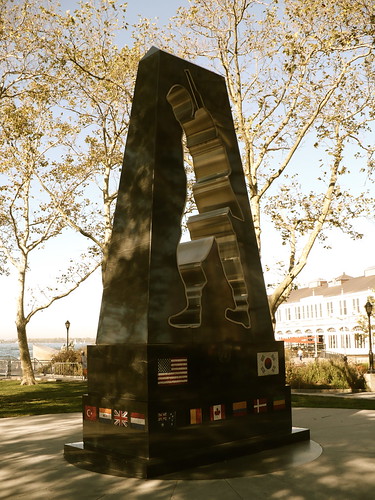
There's also the American Merchant Mariners' Memorial, inspired in design by an old photograph.

The eeriness of it comes from how the water rises and falls against the man in need of rescuing. Sometimes his head is above the water. Other times it isn't.

The groups met at the Staten Island Ferry's Whitehall Terminal at the southern tip of Manhattan. I noticed, for the first time, a vendor selling only selfie sticks (usually it's bottles of water or umbrellas).

First we cut through Battery Park, best known for its views of the Statue of Liberty, but home to several sculptures and monuments of its own worth visiting. Like the New York Korean War Veterans Memorial; it's a war that tends to get overlooked, crowded out of American memory by WWII and the Vietnam War.

There's also the American Merchant Mariners' Memorial, inspired in design by an old photograph.

The eeriness of it comes from how the water rises and falls against the man in need of rescuing. Sometimes his head is above the water. Other times it isn't.

Labels:
art,
buildings,
New York City,
parks,
photography,
photos (mine),
sculpture,
walks,
water
Friday, October 9, 2015
Wednesday, October 7, 2015
Week in Seven Words #264
blanching
The fluorescent lights wash the life out of her face. She stares at me with smudged eyes.
channeled
It occurs to me that I'm only really learning at this point in life what to do with anger. Before, my conscious attitude towards it was, "Don't have it" and "Feel guilty about having it." I hadn't really thought of it as a healthy emotion, although - when confronted, understood and directed in mature ways - it definitely can be. Denying it is self-destructive.
erudition
Books with gilt-edged pages bursting out of mahogany shelves.
mean-spirited
It's not ignorance that bothers me so much as people acting triumphant about what they don't know. They're proud to not make an effort to learn or think about something, even while sharing their opinion or making decisions about it. They smirk at my frustration, like they've beaten me at a game I never agreed to play. At this point, I try not to engage with them, or I don't show much of an emotional response when I do. Easier to do when there's no personal connection between us; but also manageable when there is, though that involves giving up on a part of the relationship.
regressing
When someone tries to take their problems out on me, one thing I do is picture them the way they looked as young children. This makes their adult-sized tantrum less stressful. Though they want me to parent them and deal with their problems for them, I don't want to be a stand-in for their mother.
sweetened
Pink stickers, Hershey's kisses - little things that brighten a run-of-the-mill evening of homework and TV.
undeterred
He stares at the orange, pink and white floral sofa. Then shrugs and arranges himself elegantly on it.
The fluorescent lights wash the life out of her face. She stares at me with smudged eyes.
channeled
It occurs to me that I'm only really learning at this point in life what to do with anger. Before, my conscious attitude towards it was, "Don't have it" and "Feel guilty about having it." I hadn't really thought of it as a healthy emotion, although - when confronted, understood and directed in mature ways - it definitely can be. Denying it is self-destructive.
erudition
Books with gilt-edged pages bursting out of mahogany shelves.
mean-spirited
It's not ignorance that bothers me so much as people acting triumphant about what they don't know. They're proud to not make an effort to learn or think about something, even while sharing their opinion or making decisions about it. They smirk at my frustration, like they've beaten me at a game I never agreed to play. At this point, I try not to engage with them, or I don't show much of an emotional response when I do. Easier to do when there's no personal connection between us; but also manageable when there is, though that involves giving up on a part of the relationship.
regressing
When someone tries to take their problems out on me, one thing I do is picture them the way they looked as young children. This makes their adult-sized tantrum less stressful. Though they want me to parent them and deal with their problems for them, I don't want to be a stand-in for their mother.
sweetened
Pink stickers, Hershey's kisses - little things that brighten a run-of-the-mill evening of homework and TV.
undeterred
He stares at the orange, pink and white floral sofa. Then shrugs and arranges himself elegantly on it.
Saturday, October 3, 2015
The dancing isn't the best thing about Dancing Lady (1933) and Dance, Girl, Dance (1940)
Older Hollywood movies often called on actors to display singing and dancing talent (and the movie industry actively recruited people from musical theater and vaudeville). Many of these movies are set in Hollywood's conception of a Broadway theater. And they can be pretty uneven, with weak plots strung around musical numbers that vary in quality.
The following two movies are uneven, but I still liked them for various reasons, including the fact that they're sometimes ridiculous. They're both theater stories, specifically stories of women trying to make it big in musical shows. Neither of them has amazing dance scenes.
(A movie I highly recommend, better than either of these and more witty, is Stage Door, which I wrote about here. It's also a much better choice if you want a non-musical drama and comedy; there are some brief scenes of dancing, but no musical numbers.)
The following two movies are uneven, but I still liked them for various reasons, including the fact that they're sometimes ridiculous. They're both theater stories, specifically stories of women trying to make it big in musical shows. Neither of them has amazing dance scenes.
(A movie I highly recommend, better than either of these and more witty, is Stage Door, which I wrote about here. It's also a much better choice if you want a non-musical drama and comedy; there are some brief scenes of dancing, but no musical numbers.)
Labels:
dance,
dreams,
fellowship,
movies,
music,
musicals,
worth watching
Thursday, October 1, 2015
Week in Seven Words #263
absented
Historic plaques in grotty subway stations. The subway system is teeming with stories no one knows, because people don't like to look around when they're waiting on a platform. They pretend they're elsewhere, maybe already at their destination, and not underground in the stale air and filth.
hindsight
When I walk along the dead lawns, I imagine meeting my younger self, taking her by the shoulders, and telling her a thing or two.
linked
I hear them chanting, and their voices are like chains of silver.
obscure
You find it in the folds of her robes: an owl. Few people would spot it or think to look for it. It will never venture out of its sheltered spot.
projected
I know I have a craving for chocolate when every large brown boulder reminds me of fudge.
pronounced
Heliotrope lipstick and hair a traffic cone shade of orange. She's lit up like a flare in the gray neighborhood.
somnolence
The interior of the historic church is made of dust, marble and roses. A man in the pews bows his head - praying, or coaxed to sleep by incense and warmth.
Historic plaques in grotty subway stations. The subway system is teeming with stories no one knows, because people don't like to look around when they're waiting on a platform. They pretend they're elsewhere, maybe already at their destination, and not underground in the stale air and filth.
hindsight
When I walk along the dead lawns, I imagine meeting my younger self, taking her by the shoulders, and telling her a thing or two.
linked
I hear them chanting, and their voices are like chains of silver.
obscure
You find it in the folds of her robes: an owl. Few people would spot it or think to look for it. It will never venture out of its sheltered spot.
projected
I know I have a craving for chocolate when every large brown boulder reminds me of fudge.
pronounced
Heliotrope lipstick and hair a traffic cone shade of orange. She's lit up like a flare in the gray neighborhood.
somnolence
The interior of the historic church is made of dust, marble and roses. A man in the pews bows his head - praying, or coaxed to sleep by incense and warmth.
Wednesday, September 23, 2015
The Periodic Table: A Chemical Narrative Framework for Primo Levi's Life
That is what nature does: it draws the fern's grace from the putrefaction of the forest floor…The Periodic Table, which I read for the Classics Club Challenge, is author Primo Levi's autobiography told in a series of elements (and translated into English by Raymond Rosenthal). Levi worked as an industrial chemist and survived a year in Auschwitz after being captured while fighting in the Italian resistance against the Nazis. Each chapter in his book centers on a different element and how it ties into some facet of his life.
I loved this unique, poetic approach to the elements. What an element symbolizes or what its association is with his life might be subtle. But it's the organizing principle of his life's narrative (at least the one he shares here) - sometimes because a memorable episode of his life involved the use of a given element, other times because someone or something reminded him of it and its properties.
There might be an important lesson from chemistry.
… one must distrust the almost-the-same (sodium is almost the same as potassium, but with sodium nothing would have happened), the practically identical, the approximate, the or-even, all surrogates, and all patchwork. The differences can be small, but they can lead to radically different consequences…But it isn't as if he spends the entirety of the text talking in chemistry-related terms. There's poetry too, and an exploration of philosophy and emotions. As when he's captured as a partisan.
During those days, when I was waiting courageously enough for death, I harbored a piercing desire for everything, for all imaginable human experiences, and a I cursed my previous life, which it seemed to me I had profited from little or badly, and I felt time running through my fingers, escaping from my body minute by minute, like a hemorrhage that can no longer be stanched.Or when he falls in love.
In a few hours we knew that we belonged to each other, not for one meeting but for life, as in fact has been the case. In a few hours I felt reborn and replete with new powers, washed clean and cured of a long sickness, finally ready to enter life with joy and vigor…And the poetry and chemistry freely mix too, as during his stint at a mine analyzing the soil for the presence of certain elements, he compares the elusive nickel to a sprite darting out of reach "with long perked ears, always ready to flee from the blows of the investigating pickax, levying you with nothing to show for it."
The use of the elements lends a certain weight and permanence to his life's story; he's tying himself to the stuff of the Earth. At the same time, his forays into chemistry often mirror the messiness and transitory qualities of his life; it's not all about simple, tidy formulae, though it feels like a triumph when a formula turns out as expected. Throughout the book he unearths episodes of his life and examines them. What holds them together? He constructs a loose narrative framework of chemistry and poetry. And somehow his life's story can hang together on that. (Which raises other questions about what constitutes a narrative, and how does one find meaning in life? He found an approach unique to his own life.)
Monday, September 21, 2015
Look Back at Summer in NYC 2015
A sunset over the Hudson

A walk through University Heights in the Bronx

and across the High Bridge from the Bronx to High Bridge Park in Manhattan

A hike through Van Cortlandt Park in the Bronx

A stroll through Fort Tryon Park in Northern Manhattan

with a stop at the Cloisters

Sunshine by the East River at Carl Schurz Park
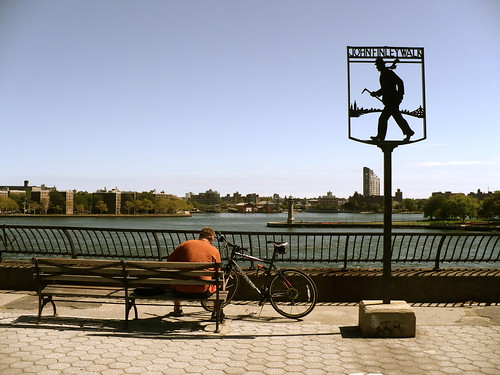
Green shadows at the Pond in the southeast corner of Central Park


A walk through University Heights in the Bronx

and across the High Bridge from the Bronx to High Bridge Park in Manhattan

A hike through Van Cortlandt Park in the Bronx

A stroll through Fort Tryon Park in Northern Manhattan

with a stop at the Cloisters

Sunshine by the East River at Carl Schurz Park

Green shadows at the Pond in the southeast corner of Central Park

Labels:
bridges,
Central Park,
flowers,
museums,
New York City,
parks,
photography,
photos (mine),
trees,
water
Sunday, September 20, 2015
Week in Seven Words #262
bedazzle
The sun's out, and the sand looks like snow, white and glittering.
commitment
She gives me her trust like she would her child. I cradle it with awkward care, feeling its quiet hammering pulse and knowing I must never lose hold of it.
deceptive
On the playground, she encounters children who lie charmingly and convincingly, who are friendly one day and insulting the next. She doesn't know what to make of them; they confuse her. Beyond what they do, it's the why - the why is at the heart of the bewildered hurt.
greased
Sleek men attend to their ale and steak.
raring
The dog, at the end of her leash, recognizes my scent, whines, leaps and strains to get close, to be petted and present her belly for a rub.
sundering
Between me and him - a window pane, the twisted branches of a tree.
wrestlers
In their academic gowns, they circle the stage and size each other up, as if their battle of wits will be a physical brawl.
The sun's out, and the sand looks like snow, white and glittering.
commitment
She gives me her trust like she would her child. I cradle it with awkward care, feeling its quiet hammering pulse and knowing I must never lose hold of it.
deceptive
On the playground, she encounters children who lie charmingly and convincingly, who are friendly one day and insulting the next. She doesn't know what to make of them; they confuse her. Beyond what they do, it's the why - the why is at the heart of the bewildered hurt.
greased
Sleek men attend to their ale and steak.
raring
The dog, at the end of her leash, recognizes my scent, whines, leaps and strains to get close, to be petted and present her belly for a rub.
sundering
Between me and him - a window pane, the twisted branches of a tree.
wrestlers
In their academic gowns, they circle the stage and size each other up, as if their battle of wits will be a physical brawl.
Labels:
animals,
dishonesty,
dogs,
fighting,
food,
separation,
sun,
trust,
week in seven words
Wednesday, September 16, 2015
Short Story Recs: Back to School Edition
Title: After Rosa Parks
Author: Janet Desaulniers
Where I Read It: Breaking Into Print
Since her divorce, Ellie has become more cautious about making mistakes. Throughout the story, there's the feel of her treading carefully around places where land mines are buried (but can her anxiousness and caution help her sidestep them?). Her young son, Cody, has just started school and tries avoiding it, with its strange rules and people; he gets sent home ill. Her brother, Frank, a veteran who has traveled aimlessly, has come to stay with her; perhaps he'll be a father figure to her son.
There's little sense of permanence or promise in this story. Frank could disappear at any time. Cody perhaps intuits that school is the start of an initiation into a life full of small aggressions and other senseless acts that chip away at you, making you a small burrowing creature who can only face the scary world with your nose to the ground and your eyes downcast. To what extent does laying low and doing what you're supposed to do help you live?
Title: The Composition
Author: Antonio Skármeta
Translators: Donald L. Schmidt and Federico Cordovez
Where I Read It: A Walk in My World
Pedro, a soccer-obsessed boy growing up in Pinochet's Chile, is vaguely aware that his parents are anti-fascist, but when he asks what an anti-fascist is, his mom tells him he's just a child, and children aren't anti-anything.
Author: Janet Desaulniers
Where I Read It: Breaking Into Print
Since her divorce, Ellie has become more cautious about making mistakes. Throughout the story, there's the feel of her treading carefully around places where land mines are buried (but can her anxiousness and caution help her sidestep them?). Her young son, Cody, has just started school and tries avoiding it, with its strange rules and people; he gets sent home ill. Her brother, Frank, a veteran who has traveled aimlessly, has come to stay with her; perhaps he'll be a father figure to her son.
There's little sense of permanence or promise in this story. Frank could disappear at any time. Cody perhaps intuits that school is the start of an initiation into a life full of small aggressions and other senseless acts that chip away at you, making you a small burrowing creature who can only face the scary world with your nose to the ground and your eyes downcast. To what extent does laying low and doing what you're supposed to do help you live?
Title: The Composition
Author: Antonio Skármeta
Translators: Donald L. Schmidt and Federico Cordovez
Where I Read It: A Walk in My World
Pedro, a soccer-obsessed boy growing up in Pinochet's Chile, is vaguely aware that his parents are anti-fascist, but when he asks what an anti-fascist is, his mom tells him he's just a child, and children aren't anti-anything.
"Children are simply children. Children your age have to go to school, study a lot, play hard, and be kind to their parents."His life is a fairly happy child's life, except for jolting events, like when his friend Daniel's father gets taken away by the police. Then one day at school, he can't avoid politics any more. An army officer shows up and tells the kids to write an entry for an essay contest. He asks them to describe exactly what their parents do and talk about in the evenings. Will Pedro mention that his parents secretly listen to the radio? Will he write about their conversations? Continuing to be an innocent child will require some political savvy.
Sunday, September 13, 2015
Week in Seven Words #261
backgrounded
On stage, there's a doctor, silent for the most part, who hangs in the background of every scene reminding people of impending death. For the actor who plays him, it must be a fun if not challenging role - he gets to look grave and silent while listening to grand music, night after night.
fibrous
Mango in ropy slices on a blue china plate.
gutless
What he tells her is a cop-out. "Heaven will reward you," he says. It's a consolation that's easy for him to offer, as he gently insists - at no cost to himself - that she give up what's important to her in this life.
inching
They're all careful in the dim, carpeted room. Their shoes are off. They speak quietly, even about things that devastate them. On a table to the side, there's seltzer and cookies.
operatic
She sings her way to an early death.
rejection
When she hugs him, he keeps his arms by his sides and turns his face away.
threadbare
She takes the view that people are motivated either by fear or by love in anything they do. Love and fear are battling all the time in her, and she's exhausted with both.
On stage, there's a doctor, silent for the most part, who hangs in the background of every scene reminding people of impending death. For the actor who plays him, it must be a fun if not challenging role - he gets to look grave and silent while listening to grand music, night after night.
fibrous
Mango in ropy slices on a blue china plate.
gutless
What he tells her is a cop-out. "Heaven will reward you," he says. It's a consolation that's easy for him to offer, as he gently insists - at no cost to himself - that she give up what's important to her in this life.
inching
They're all careful in the dim, carpeted room. Their shoes are off. They speak quietly, even about things that devastate them. On a table to the side, there's seltzer and cookies.
operatic
She sings her way to an early death.
rejection
When she hugs him, he keeps his arms by his sides and turns his face away.
threadbare
She takes the view that people are motivated either by fear or by love in anything they do. Love and fear are battling all the time in her, and she's exhausted with both.
Labels:
character,
classical music,
fear,
food,
fruits,
love,
music,
opera,
recovery,
week in seven words
Tuesday, September 8, 2015
The Sheer Prettiness of Provincetown
I recently visited Boston for a few days and made a day trip to Provincetown with a ferry (the Boston Harbor Cruises one). I'd never been to Provincetown (or any other part of Cape Cod), and it was a treat. Even the parts of town that were most blatantly a tourist trap were still lovely.
I stuck to Commercial Street, first walking all the way west to where it begins near the spot where the Pilgrims first landed in the 1600s (it wasn't at Plymouth, but Provincetown - they moved on to Plymouth a little later). At the spot historians determined is likely the one where they made their stop, there's a plaque and a small park (Pilgrims' First Landing Park). Off the park, a small beach and a jetty made of large rocks.

I walked out onto the jetty for a while. I loved listening to the water rushing under the rocks (where I also found some smashed shells, probably from sea gulls dropping them on the rocks to get at the meat inside).
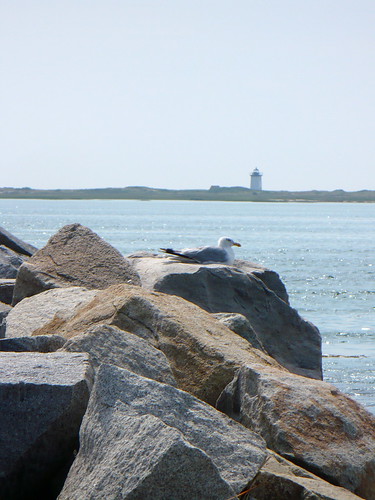
And I loved the smell of the salt marsh all around.

I stuck to Commercial Street, first walking all the way west to where it begins near the spot where the Pilgrims first landed in the 1600s (it wasn't at Plymouth, but Provincetown - they moved on to Plymouth a little later). At the spot historians determined is likely the one where they made their stop, there's a plaque and a small park (Pilgrims' First Landing Park). Off the park, a small beach and a jetty made of large rocks.

I walked out onto the jetty for a while. I loved listening to the water rushing under the rocks (where I also found some smashed shells, probably from sea gulls dropping them on the rocks to get at the meat inside).

And I loved the smell of the salt marsh all around.

Sunday, September 6, 2015
Week in Seven Words #260
digested
He admits to getting most of his news from The Daily Show as a way to relieve anxiety about the awfulness of current events. When the news is delivered in humorous form, he's better able to accept it.
entrapped
In the subway station, a toddler is shrieking. She's stuck in one of the vertical turnstiles. The bars pin her into a small dark space. They shiver when she pushes against them, but they don't swing around to let her out.
hints
There are signs of life on the stairwell - cigarette butts, a candy wrapper, a bookmark with a black kitten.
lushly
A wine-colored taffeta gown swaying at the ankles.
productive
Anxiety often stifles creativity, but sometimes it's a source of new ideas - a solution I hadn't thought of before, a twist to a plot that hadn't occurred to me until the problem began to eat its way through my mind.
stormy
The eye of the media is on them, and with it comes the windy noise of commentary. It will pass soon.
swapped
Instead of trains, he pushes trucks onto the tracks; dump trucks linked to cement mixers that are hooked up to tractor-trailers.
He admits to getting most of his news from The Daily Show as a way to relieve anxiety about the awfulness of current events. When the news is delivered in humorous form, he's better able to accept it.
entrapped
In the subway station, a toddler is shrieking. She's stuck in one of the vertical turnstiles. The bars pin her into a small dark space. They shiver when she pushes against them, but they don't swing around to let her out.
hints
There are signs of life on the stairwell - cigarette butts, a candy wrapper, a bookmark with a black kitten.
lushly
A wine-colored taffeta gown swaying at the ankles.
productive
Anxiety often stifles creativity, but sometimes it's a source of new ideas - a solution I hadn't thought of before, a twist to a plot that hadn't occurred to me until the problem began to eat its way through my mind.
stormy
The eye of the media is on them, and with it comes the windy noise of commentary. It will pass soon.
swapped
Instead of trains, he pushes trucks onto the tracks; dump trucks linked to cement mixers that are hooked up to tractor-trailers.
Labels:
anxiety,
childhood,
creativity,
current events,
dress,
fear,
media,
stuck,
T.V.,
trains,
week in seven words
Sunday, August 9, 2015
Four Short Stories Where an Animal's Misfortune Shows Something Toxic About People
Title: Everything in This Country Must
Author: Colum McCann
Where I Read It: The Art of the Story
Katie, the narrator, is a teenager who lives with her father on a farm in Northern Ireland. At the start of the story, their draft horse is stuck in a river and will likely drown. Salvation for the horse might come from a group of British soldiers passing by, but what will Katie's father choose - the horse's life or a burden of bitter gratitude to the despised soldiers? From the beginning of the story, all hope seems to have drowned. Katie's father can't imagine a world without grief, a world where even an inadequate reparation or artless act of kindness is possible.
Title: In the Zoo
Author: Jean Stafford
Where I Read It: The Granta Book of the American Short Story
Two orphaned sisters come to live with their grandmother's friend, Mrs. Placer, who runs a boarding house. The atmosphere in the house is poisonous, full of suspicion and malice. Mrs. Placer and the boarders talk about everyone in town in the worst light. They don't see good in other people; they like to puncture people's happiness and go out of their way to find petty motives even in kinder acts. The story shows the children marinating in this toxic environment.
Some escape might come from Mr. Murphy, a man who spends his days drinking and looking after a small menagerie. He gives the sisters a puppy one day, a bit of innocence and warmth in Mrs. Placer's house. The girls call the dog Laddy, and he becomes their companion. However, Mrs. Placer gets the idea that Laddy could be retrained as a fierce guard dog. With harsh tactics, she turns the dog violent and calls him Caesar.
What the dog eventually does, and what happens to him, is the most obvious example of the kind of corruption and deformation that Mrs. Placer brings about. What she does to the girls is more subtle. Hers is a steady drip of poison.
Title: Puppy
Author: George Saunders
Where I Read It: The Book of Other People
There's a puppy at the heart of this story, and his survival depends on two people understanding each other. One is the puppy's current owner, a woman living in a mess of poverty, ignorance, good intentions and violence. The other is a prospective buyer, a woman who currently has a more stable, dignified life and wants to give her children a pet. The puppy is a mute character, sidelined. Though he's the one whose life hangs in the balance, he takes second place to the human drama - the quick judgments, the incomprehension and horror.
Title: The Silent Traders
Author: Yūko Tsushima
Translator: Geraldine Harcourt
Where I Read It: Mothers & Daughters
With her two young children, a woman has returned to the neighborhood where she grew up. Near her home there's an overgrown park, pleasant to visit, but also a source of mystery and unease. Cats have proliferated there. The woman remembers how, during her childhood, people would abandon pets in that park. All those unwanted animals dumped among the trees.
The park's a place where people get rid of what's messy in their life. But they can still imagine their pets thriving, leading fantasy lives in a magical wood. (Or maybe facing horrors in the dark.) The park is full of possibility. And the animals in it, cast aside, resonate with the woman in the story - as she and her children are also a mess in someone's life, a complication that needs to be put out of sight.
Author: Colum McCann
Where I Read It: The Art of the Story
Katie, the narrator, is a teenager who lives with her father on a farm in Northern Ireland. At the start of the story, their draft horse is stuck in a river and will likely drown. Salvation for the horse might come from a group of British soldiers passing by, but what will Katie's father choose - the horse's life or a burden of bitter gratitude to the despised soldiers? From the beginning of the story, all hope seems to have drowned. Katie's father can't imagine a world without grief, a world where even an inadequate reparation or artless act of kindness is possible.
Title: In the Zoo
Author: Jean Stafford
Where I Read It: The Granta Book of the American Short Story
Two orphaned sisters come to live with their grandmother's friend, Mrs. Placer, who runs a boarding house. The atmosphere in the house is poisonous, full of suspicion and malice. Mrs. Placer and the boarders talk about everyone in town in the worst light. They don't see good in other people; they like to puncture people's happiness and go out of their way to find petty motives even in kinder acts. The story shows the children marinating in this toxic environment.
Some escape might come from Mr. Murphy, a man who spends his days drinking and looking after a small menagerie. He gives the sisters a puppy one day, a bit of innocence and warmth in Mrs. Placer's house. The girls call the dog Laddy, and he becomes their companion. However, Mrs. Placer gets the idea that Laddy could be retrained as a fierce guard dog. With harsh tactics, she turns the dog violent and calls him Caesar.
What the dog eventually does, and what happens to him, is the most obvious example of the kind of corruption and deformation that Mrs. Placer brings about. What she does to the girls is more subtle. Hers is a steady drip of poison.
Title: Puppy
Author: George Saunders
Where I Read It: The Book of Other People
There's a puppy at the heart of this story, and his survival depends on two people understanding each other. One is the puppy's current owner, a woman living in a mess of poverty, ignorance, good intentions and violence. The other is a prospective buyer, a woman who currently has a more stable, dignified life and wants to give her children a pet. The puppy is a mute character, sidelined. Though he's the one whose life hangs in the balance, he takes second place to the human drama - the quick judgments, the incomprehension and horror.
Title: The Silent Traders
Author: Yūko Tsushima
Translator: Geraldine Harcourt
Where I Read It: Mothers & Daughters
With her two young children, a woman has returned to the neighborhood where she grew up. Near her home there's an overgrown park, pleasant to visit, but also a source of mystery and unease. Cats have proliferated there. The woman remembers how, during her childhood, people would abandon pets in that park. All those unwanted animals dumped among the trees.
The park's a place where people get rid of what's messy in their life. But they can still imagine their pets thriving, leading fantasy lives in a magical wood. (Or maybe facing horrors in the dark.) The park is full of possibility. And the animals in it, cast aside, resonate with the woman in the story - as she and her children are also a mess in someone's life, a complication that needs to be put out of sight.
Labels:
abuse,
animals,
cats,
childhood,
dogs,
good short fiction,
short stories
Sunday, July 19, 2015
Week in Seven Words #259
audacious
A cockroach scales the chrome and neon walls of the ice cream parlor like a sci-fi hero.
bluster
A storm whips the houses, cloaks the streetlights.
chagrin
She doesn't want to admit to buying the junk food for herself, so she claims it's for friends or family. It gets me annoyed with how much guilt and shame is associated with food (with some brands even labeling their products 'guilt-free'), as if shame or guilt will reliably motivate people to make healthier choices long-term. And as if it's shameful to have some dessert.
choo-choo
He asks me what I'm sentimental about. The first thing that comes to mind: trains. I still have sentimental ideas about taking a train trip across the US. I know I'm romanticizing Amtrak. Amtrak, of all things. I know about the possible difficulties of long distance train travel, especially in this country, where it's not a popular way to get around. But I really like traveling by train (even in subways sometimes, when the cars aren't crowded). For more than several hours? I don't know. I haven't done it yet.
fostering
What makes for a good friend? Someone who can respect you and accept your essential self. Who can challenge you without belittling you. You can grow, and they will not insist that you need to stay the same or make yourself smaller to suit them. They will not demand that you stick to an outdated version of yourself or a version of you they've built up rigidly in their minds.
sensuously
She presses a lemon to her ear, pauses, puts it down. Picks another one to listen to and decides to keep it. Then she moves on to the peaches. She rolls them against her cheek, one by one, until she finds the peach with the most pleasing caress.
variation
Imperfections enhance beauty.
A cockroach scales the chrome and neon walls of the ice cream parlor like a sci-fi hero.
bluster
A storm whips the houses, cloaks the streetlights.
chagrin
She doesn't want to admit to buying the junk food for herself, so she claims it's for friends or family. It gets me annoyed with how much guilt and shame is associated with food (with some brands even labeling their products 'guilt-free'), as if shame or guilt will reliably motivate people to make healthier choices long-term. And as if it's shameful to have some dessert.
choo-choo
He asks me what I'm sentimental about. The first thing that comes to mind: trains. I still have sentimental ideas about taking a train trip across the US. I know I'm romanticizing Amtrak. Amtrak, of all things. I know about the possible difficulties of long distance train travel, especially in this country, where it's not a popular way to get around. But I really like traveling by train (even in subways sometimes, when the cars aren't crowded). For more than several hours? I don't know. I haven't done it yet.
fostering
What makes for a good friend? Someone who can respect you and accept your essential self. Who can challenge you without belittling you. You can grow, and they will not insist that you need to stay the same or make yourself smaller to suit them. They will not demand that you stick to an outdated version of yourself or a version of you they've built up rigidly in their minds.
sensuously
She presses a lemon to her ear, pauses, puts it down. Picks another one to listen to and decides to keep it. Then she moves on to the peaches. She rolls them against her cheek, one by one, until she finds the peach with the most pleasing caress.
variation
Imperfections enhance beauty.
Labels:
beauty,
desserts,
fellowship,
food,
guilt,
imperfection,
insects,
shopping,
storms,
trains,
week in seven words
Thursday, July 16, 2015
Cleo and the Black Boston Elite in The Living Is Easy by Dorothy West
… she would cut off her arm for these sisters of hers with the same knife she held at the tenderest spot in their hearts.That's Cleo, the main character of a book that brings to life the world of Boston's black elite shortly before and during the First World War.
Cleo is originally from the South, but after making her way north learns the social refinements of northern cities and marries a down-to-earth businessman, Bart Judson, whose money helps her maintain her social airs. She doesn't see herself as black so much as Bostonian, and wants to raise her daughter, Judy, to also be a little Bostonian lady.
Dorothy West's The Living Is Easy, which I read for the Classics Club Challenge, is fascinating for two main reasons.
Tuesday, July 14, 2015
Sunday, July 12, 2015
Week in Seven Words #258
application
Tentative fingers and solemn attention as she plays a two-handed piece on the keyboard.
finds
Blue shells, brown leaves and a star-shaped badge with a rusted pin.
observance
A hardheaded waitress serves clam chowder to one, fried chicken and a heap of pasta to another. Raises her eyebrow as she hands me my meal, an iced tea.
shifts
His car smells like cake air freshener and newsprint. Magazines slide around under my feet as he drives.
showered
A hole has torn open in the clouds. Light soft as talc sifts down to a bare tree by the water.
trimmed
They can take ten photos of a scene I'm in, and I won't appear in a single one.
variegated
Colonies of salty pools among yellow weeds and striated rock.
Tentative fingers and solemn attention as she plays a two-handed piece on the keyboard.
finds
Blue shells, brown leaves and a star-shaped badge with a rusted pin.
observance
A hardheaded waitress serves clam chowder to one, fried chicken and a heap of pasta to another. Raises her eyebrow as she hands me my meal, an iced tea.
shifts
His car smells like cake air freshener and newsprint. Magazines slide around under my feet as he drives.
showered
A hole has torn open in the clouds. Light soft as talc sifts down to a bare tree by the water.
trimmed
They can take ten photos of a scene I'm in, and I won't appear in a single one.
variegated
Colonies of salty pools among yellow weeds and striated rock.
Friday, July 10, 2015
Three Short Stories Exploring Profound Loneliness
Title: Death of a Traveling Salesman
Author: Eudora Welty
Where I read it: The Oxford Book of the American South
R.J. Bowman, a traveling salesman, lives in a string of impersonal hotels with no one to help care for him when he's sick. His life hasn't made an impression on anyone. After almost driving his car off a cliff in a backwoods area, he finds himself, shaken and unwell, in the home of two people who live primitively. But even in that impoverished home, he discovers intimacy - an unspoken, simple closeness between people.
Title: The Museum
Author: Leila Aboulela
Where I read it: The Anchor Book of Modern African Stories
Shadia, a Sudanese woman, attends a graduate program in statistics in Aberdeen. Throughout the story, she suffers from a lack of connection to anyone. What she misses most about home aren't the people (including a fiancé who talks at her over the phone); it's the familiar places and experiences of day-to-day living she's homesick for.
It's not as if home is in all ways attractive to her. At home, there are people - like her mother and her fiancé – who try to pin her down, make sure her life fits a certain mold. (At one point, she mentions childhood visits with her father, who had left her mother years before, and how she enjoyed those visits because he kept mixing her up with her sisters; she could pretend to be different things with him, because he didn't have a fixed idea of who she was or should be.)
At the same time, Scotland is alien to her. In the course of the story, she develops a tentative friendship with a classmate, Bryan. Bryan's interest in her leads him to try to understand her culture and do some things that would make him more appealing to her. However, there's the possibility that Bryan, who hasn't traveled much but really wants to get out of Aberdeen, is attracted to her because she's exotic and represents an escape. How much about her can he understand?
At the end, he tries to shows his willingness to understand by inviting her to a local museum where there's an exhibit on Africa. But it's a jarring visit for Shadia, because the exhibit focuses on the exploits of European visitors and the kinds of animals one would see on the African continent. Where are the people? There's nothing of life at home that she recognizes.
Shadia's life is in a state of suspension between cultures, and no one seems to know who she is and what she really wants (and it's not as if she's clear on that herself). She misses home, but there are traps waiting for her there - stifling relationships. Could she make a home in Scotland and also open Bryan's eyes more? Or would that be too difficult, maybe even impossible for her?
Title: The Prospect from the Silver Hills
Author: Jim Crace
Where I read it: The Art of the Story
The main character struck me as already odd and alone when he starts his isolated job. He works as an agent for a company that's prospecting for precious stones and valuable metals in a remote region. His job is to examine samples of earth that have been dug out to see if there's anything promising in them.
But what does it mean that he's odd, and how does this oddness intensify? He imagines a wife and family for himself. He doesn't fit in with the work crew, who initially make some attempts to socialize with him. And how he experiences the land is increasingly at odds with how the company wants him to see it. He develops a sensual appreciation of what's dug out of the earth, and he restores it in unique, aesthetically pleasing ways.
He sees things in the land that no one else sees. He's cut himself off from other people and established his own world and his own system of values. That's his loneliness, his madness and vision. It highlights some of the arbitrariness in the values other people assign to things. Maybe this lonely man saw no way to find the things he valued within established society, so he made a world of his own - and, through isolation and sleeplessness and his own vision, he found a home permanently there. Until he's one with the hills, like a figure in folklore, not entirely human.
(As I was writing about this last story, it brought to mind Virginia Woolf's "Solid Objects," which I wrote about here. There's a similarity in the characters' obsessions about what they find in the earth, and the increased disconnect from society and its values.)
Author: Eudora Welty
Where I read it: The Oxford Book of the American South
R.J. Bowman, a traveling salesman, lives in a string of impersonal hotels with no one to help care for him when he's sick. His life hasn't made an impression on anyone. After almost driving his car off a cliff in a backwoods area, he finds himself, shaken and unwell, in the home of two people who live primitively. But even in that impoverished home, he discovers intimacy - an unspoken, simple closeness between people.
These people cherished something here that he could not see, they withheld some ancient promise of food and warmth and light.Although they're hospitable to him, he remains outside the circle of domestic warmth. And he wonders why he doesn't have such warmth in his own life. It's a simple thing, found even in the most remote places, so why not in his life? What he's seeing is basic to life but absent from him; how is he still alive?
Title: The Museum
Author: Leila Aboulela
Where I read it: The Anchor Book of Modern African Stories
Shadia, a Sudanese woman, attends a graduate program in statistics in Aberdeen. Throughout the story, she suffers from a lack of connection to anyone. What she misses most about home aren't the people (including a fiancé who talks at her over the phone); it's the familiar places and experiences of day-to-day living she's homesick for.
It's not as if home is in all ways attractive to her. At home, there are people - like her mother and her fiancé – who try to pin her down, make sure her life fits a certain mold. (At one point, she mentions childhood visits with her father, who had left her mother years before, and how she enjoyed those visits because he kept mixing her up with her sisters; she could pretend to be different things with him, because he didn't have a fixed idea of who she was or should be.)
At the same time, Scotland is alien to her. In the course of the story, she develops a tentative friendship with a classmate, Bryan. Bryan's interest in her leads him to try to understand her culture and do some things that would make him more appealing to her. However, there's the possibility that Bryan, who hasn't traveled much but really wants to get out of Aberdeen, is attracted to her because she's exotic and represents an escape. How much about her can he understand?
At the end, he tries to shows his willingness to understand by inviting her to a local museum where there's an exhibit on Africa. But it's a jarring visit for Shadia, because the exhibit focuses on the exploits of European visitors and the kinds of animals one would see on the African continent. Where are the people? There's nothing of life at home that she recognizes.
Shadia's life is in a state of suspension between cultures, and no one seems to know who she is and what she really wants (and it's not as if she's clear on that herself). She misses home, but there are traps waiting for her there - stifling relationships. Could she make a home in Scotland and also open Bryan's eyes more? Or would that be too difficult, maybe even impossible for her?
Title: The Prospect from the Silver Hills
Author: Jim Crace
Where I read it: The Art of the Story
The main character struck me as already odd and alone when he starts his isolated job. He works as an agent for a company that's prospecting for precious stones and valuable metals in a remote region. His job is to examine samples of earth that have been dug out to see if there's anything promising in them.
But what does it mean that he's odd, and how does this oddness intensify? He imagines a wife and family for himself. He doesn't fit in with the work crew, who initially make some attempts to socialize with him. And how he experiences the land is increasingly at odds with how the company wants him to see it. He develops a sensual appreciation of what's dug out of the earth, and he restores it in unique, aesthetically pleasing ways.
A stone of apple-green he removed and walked with it into the valley where in a cave there were lichens of the same colour. A fistful of grit he scattered in the grass so that it fell amongst the leaf joints like sleet.His sense of what is valuable no longer has anything to do with what other people find valuable. He's concerned with what looks good, what fits, and whether a place seems whole and restored.
He sees things in the land that no one else sees. He's cut himself off from other people and established his own world and his own system of values. That's his loneliness, his madness and vision. It highlights some of the arbitrariness in the values other people assign to things. Maybe this lonely man saw no way to find the things he valued within established society, so he made a world of his own - and, through isolation and sleeplessness and his own vision, he found a home permanently there. Until he's one with the hills, like a figure in folklore, not entirely human.
(As I was writing about this last story, it brought to mind Virginia Woolf's "Solid Objects," which I wrote about here. There's a similarity in the characters' obsessions about what they find in the earth, and the increased disconnect from society and its values.)
Thursday, July 9, 2015
Week in Seven Words #257
disencumber
She talks like someone who hasn't had anyone hear her for a long time.
distorted
The grand hall is dark and full of music that rakes the air apart. Sickly green light slides down the walls and swirls around the ceiling.
enclosure
She is lying to others to give herself space to heal.
insistent
The unreasonable expectation that my friend will immediately run out and get a book I recommended, read it at once and respond to it with the same enthusiasm I did.
judged
"It was not the best day ever," she says, pronouncing judgment on a family outing.
loathsome
Protracted shame is one of the worst emotions anyone can feel. There's no hope in it. It's a dirty, secretive worm. That's why abusive people, whether consciously or not, are so eager for others to feel this; it keeps people suffering quietly, convinced of their own defectiveness.
pulverize
Music in waves that pound my eardrums to sand.
She talks like someone who hasn't had anyone hear her for a long time.
distorted
The grand hall is dark and full of music that rakes the air apart. Sickly green light slides down the walls and swirls around the ceiling.
enclosure
She is lying to others to give herself space to heal.
insistent
The unreasonable expectation that my friend will immediately run out and get a book I recommended, read it at once and respond to it with the same enthusiasm I did.
judged
"It was not the best day ever," she says, pronouncing judgment on a family outing.
loathsome
Protracted shame is one of the worst emotions anyone can feel. There's no hope in it. It's a dirty, secretive worm. That's why abusive people, whether consciously or not, are so eager for others to feel this; it keeps people suffering quietly, convinced of their own defectiveness.
pulverize
Music in waves that pound my eardrums to sand.
Tuesday, June 30, 2015
Two different books unfolding in Little Women

Somehow my American girlhood went by without a single reading of Little Women. So for the Classics Club Challenge, I read it. I can't react to it anymore the way I probably would have as a teen, though I know I would have strongly identified with Jo and enjoyed the book as a whole.
What struck me, reading it now, is how throughout the book there's a tension between two authorial voices. It's almost as if there are two different books in Little Women, one of them brighter, more picturesque and calling more attention to itself, and the other one a subtle, shadowy book that adds disquiet to the story.
The vignettes in the lives of the four sisters - Meg, Jo, Amy and Beth - often get wrapped up neatly. Though Alcott's characters come across as real and not like cut-out figures serving as moral examples, there's a tidy lesson from many of these episodes. It's what you'd expect in a 19th-century book geared towards a younger audience; the girls need to become proper little women. On the other hand, throughout these vignettes there are some darker currents and some sources of tension that persist even after the tidier resolutions. Sometimes the text is sentimental, even verging on treacly; other times there's a surprising wry humor and unease.
Let's look at Jo, for instance. While capable of great devotion and care towards others, she's also the most spirited and unladylike of the girls and wishes she could have enjoyed a boy's greater freedom. Like Alcott, she's a writer. Jo settles into a more conventional role at the end (mothering boys, when she can't travel much or go to school like one) - though at the same time she keeps her ambitions to write. The resolution to her story is complicated; she has made major concessions to what's expected of her as a proper little woman, but her old restlessness and dreams are by no means entirely tamed (what will become of her dreams is left open-ended).
Death, poverty, the conflict between what you want or need for yourself and what's expected of you - all of these the novel touches on, in a more tidy way front and center, but with the rawness at the edges, unexplored territory on the margins. Alcott was deeply familiar with all of these themes and with the messiness of life. And the fact that she lets this untidiness into her book to varying degrees, and gives her own strong personality some room to play throughout the text, keeps it from being only charming or sentimentally affecting in a simple way.
Saturday, June 27, 2015
Friday, June 26, 2015
Week in Seven Words #256
I'm sorry for the nearly month-long absence on this blog. The reason was a combination of lots of work and a needed blog break.
anticipant
She peers into the audience, her face nervous and expectant, knowing her family will be there but needing to see them.
crestfallen
"I stink at this," is what one child says every time she doesn't get something right the first time. Who is she echoing?
easy-going
She sits on the floor in her power suit, at ease when kids tumble around her legs.
huddled
They're the same type of people - same background, same lifestyle - so it doesn't matter what they say to each other; they're happy with the knowledge that they're the same and that their conversation will be safe.
pathetically
Out of pity I buy a small stuffed animal with lumpy ears. A dog, I think. An aspiring dog.
restorative
The clean scent of linens in a drawer.
true
While the others are match sparks and unsteady flames, she's a lamp, steady and gentle in the dark.
anticipant
She peers into the audience, her face nervous and expectant, knowing her family will be there but needing to see them.
crestfallen
"I stink at this," is what one child says every time she doesn't get something right the first time. Who is she echoing?
easy-going
She sits on the floor in her power suit, at ease when kids tumble around her legs.
huddled
They're the same type of people - same background, same lifestyle - so it doesn't matter what they say to each other; they're happy with the knowledge that they're the same and that their conversation will be safe.
pathetically
Out of pity I buy a small stuffed animal with lumpy ears. A dog, I think. An aspiring dog.
restorative
The clean scent of linens in a drawer.
true
While the others are match sparks and unsteady flames, she's a lamp, steady and gentle in the dark.
Thursday, May 28, 2015
Hike in Inwood Hill Park, Walk Down Riverside Drive
At the end of April, I went on a ranger-led hike of Inwood Hill Park at the north tip of Manhattan, then walked down along the island's west side. The title of the post is a little misleading, because not all of it was on Riverside Drive, but I did cover a long stretch of Riverside Drive too.
The outskirts of Inwood Hill Park look like a typical city park, very pretty in the spring.

Further in, you start getting some more of the local history. Like, here is what some people believe is the exact spot where the Dutch purchased Manhattan for a paltry sum.

As discussed by the ranger, the Dutch and the Native Americans appeared to have different ideas of what the transaction meant (there's an interesting discussion of it here).
The spot, marked by a boulder called Shorakkopoch Rock, used to be the site of a massive, centuries-old tulip tree that was eventually cut down.
Nearby, there are still other tulip trees soaring up.

The outskirts of Inwood Hill Park look like a typical city park, very pretty in the spring.

Further in, you start getting some more of the local history. Like, here is what some people believe is the exact spot where the Dutch purchased Manhattan for a paltry sum.

As discussed by the ranger, the Dutch and the Native Americans appeared to have different ideas of what the transaction meant (there's an interesting discussion of it here).
The spot, marked by a boulder called Shorakkopoch Rock, used to be the site of a massive, centuries-old tulip tree that was eventually cut down.
Nearby, there are still other tulip trees soaring up.

Labels:
American history,
art,
buildings,
nature,
New York City,
parks,
photography,
photos (mine),
sculpture,
streets,
trees,
walks,
water,
windows
Thursday, May 14, 2015
Week in Seven Words #255
anticipatory
He'll ask you a question he thinks you can't answer. As you pause to think, he'll line up the first words of his lecture. Don't disappoint him by knowing the answer.
gravelly
Her voice comes at me in puffs and crackles from hundreds of miles away.
minacious
Not for a minute do I buy into his kindly Kris Kringle routine. There's a knife's edge to his smile, the glint of a blade.
ping-pong
They leave their office doors open so they can banter across the hallway.
reckoning
As the elevator takes us down, she crouches in a corner, her arms wrapped around her knees, and watches the numbers with solemn attention.
shuffling
It's a dystopian scene, the gray crowds removing shoes and belts before filing through the metal detectors.
testy
As they give him advice, he turns his cellphone over and over on the table, his leg shuddering up and down. From time to time, he starts to say something - to defend himself or make himself look more experienced than he is - but they talk over him, and he subsides into a disgruntled silence.
He'll ask you a question he thinks you can't answer. As you pause to think, he'll line up the first words of his lecture. Don't disappoint him by knowing the answer.
gravelly
Her voice comes at me in puffs and crackles from hundreds of miles away.
minacious
Not for a minute do I buy into his kindly Kris Kringle routine. There's a knife's edge to his smile, the glint of a blade.
ping-pong
They leave their office doors open so they can banter across the hallway.
reckoning
As the elevator takes us down, she crouches in a corner, her arms wrapped around her knees, and watches the numbers with solemn attention.
shuffling
It's a dystopian scene, the gray crowds removing shoes and belts before filing through the metal detectors.
testy
As they give him advice, he turns his cellphone over and over on the table, his leg shuddering up and down. From time to time, he starts to say something - to defend himself or make himself look more experienced than he is - but they talk over him, and he subsides into a disgruntled silence.
Saturday, May 9, 2015
Five Short Stories Featuring Mothers and Daughters
Title: Ashputtle: Or, the Mother’s Ghost
Author: Angela Carter
Where I Read It: Mothers & Daughters
Carter writes three versions of the Cinderella story, not with the 'bibbity bobbity boo' Disney godmother, but with Cinderella's dead mother helping her in some way (usually in the form of a guiding animal spirit). The three versions vary in violence, in the desperate competitiveness between the girl & her mother vs. the tormenting stepmother and her brood, and the freedom the dead mother grants her daughter.
There's only one version where the mother gives her daughter some gifts and then sets her free to embark on life, where it may take her. In others, the vision she has for her daughter is more fixed; she controls her daughter and maneuvers her into a narrow role. It's for her daughter's own good, she would say, because why take chances? But taking chances makes that third version, the freer one, so compelling. The mother trusts her daughter most in that one.
Author: Angela Carter
Where I Read It: Mothers & Daughters
Carter writes three versions of the Cinderella story, not with the 'bibbity bobbity boo' Disney godmother, but with Cinderella's dead mother helping her in some way (usually in the form of a guiding animal spirit). The three versions vary in violence, in the desperate competitiveness between the girl & her mother vs. the tormenting stepmother and her brood, and the freedom the dead mother grants her daughter.
There's only one version where the mother gives her daughter some gifts and then sets her free to embark on life, where it may take her. In others, the vision she has for her daughter is more fixed; she controls her daughter and maneuvers her into a narrow role. It's for her daughter's own good, she would say, because why take chances? But taking chances makes that third version, the freer one, so compelling. The mother trusts her daughter most in that one.
Tuesday, May 5, 2015
Five Short Stories Featuring Mothers and Sons
Title: Donal Webster
Author: Colm Tóibín
Where I Read It: The Book of Other People
This is a meditative and melancholy story, where the narrator shares his thoughts with someone off-screen. He reflects on the time his mother was dying. They had been distant from each other, and he wonders if he'd made the right choice to move so far from home, to a different continent. Then again, the distance between them was never only physical.
Of the three children (two boys and a girl), he's the less preferred son. It always seemed to him that way. It's possible his mother loved him, but he isn't certain of her love or its strength. Maybe, had he remained close to her side throughout his adult life, they would have enjoyed a more loving relationship, but there's no guarantee it would have made any difference. He's considering what a second chance between them might have meant, knowing it might not have changed anything important. Maybe circumstances were set against him from the start, and he was never meant to receive his mother's closeness or love.
There's much that's left unresolved in this story. The narrator shares it not because he's cleared up a mystery or made a last-minute connection to his distant mother, but because the story seemed to have been echoing in him until he needed to let it out.
Author: Colm Tóibín
Where I Read It: The Book of Other People
This is a meditative and melancholy story, where the narrator shares his thoughts with someone off-screen. He reflects on the time his mother was dying. They had been distant from each other, and he wonders if he'd made the right choice to move so far from home, to a different continent. Then again, the distance between them was never only physical.
Of the three children (two boys and a girl), he's the less preferred son. It always seemed to him that way. It's possible his mother loved him, but he isn't certain of her love or its strength. Maybe, had he remained close to her side throughout his adult life, they would have enjoyed a more loving relationship, but there's no guarantee it would have made any difference. He's considering what a second chance between them might have meant, knowing it might not have changed anything important. Maybe circumstances were set against him from the start, and he was never meant to receive his mother's closeness or love.
There's much that's left unresolved in this story. The narrator shares it not because he's cleared up a mystery or made a last-minute connection to his distant mother, but because the story seemed to have been echoing in him until he needed to let it out.
Sunday, May 3, 2015
Week in Seven Words #254
accompaniment
As I'm walking, I hear a man sing. He has a beautiful voice. He's behind me, walking and singing to himself. I don't ask him what he's singing or otherwise speak with him. But I slow down so his voice can follow me for longer.
conduction
The electric shock feels like a rubber band snapping hard against my fingers.
costly
Though he no longer smokes, he still keeps careful track of cigarette costs. He likes to imagine himself buying cigarettes, while reminding himself of how much money he's saving by resisting the impulse.
electromyogram
A short, thin needle goes into the arm. The muscles flex. The monitor crackles. Muscle activity turns into a roar.
hunched
At the table, he presses his face into a book, his body radiating embarrassment.
listless
Red flags on his cheeks, a feverish glaze on his eyes.
ultimata
Behind each question is the same insistent, unspoken question: "Do you measure up exactly to my standards?" And the unspoken follow-up: "You'd better, or else."
As I'm walking, I hear a man sing. He has a beautiful voice. He's behind me, walking and singing to himself. I don't ask him what he's singing or otherwise speak with him. But I slow down so his voice can follow me for longer.
conduction
The electric shock feels like a rubber band snapping hard against my fingers.
costly
Though he no longer smokes, he still keeps careful track of cigarette costs. He likes to imagine himself buying cigarettes, while reminding himself of how much money he's saving by resisting the impulse.
electromyogram
A short, thin needle goes into the arm. The muscles flex. The monitor crackles. Muscle activity turns into a roar.
hunched
At the table, he presses his face into a book, his body radiating embarrassment.
listless
Red flags on his cheeks, a feverish glaze on his eyes.
ultimata
Behind each question is the same insistent, unspoken question: "Do you measure up exactly to my standards?" And the unspoken follow-up: "You'd better, or else."
Thursday, April 30, 2015
Israel Trip Highlights (Part 2 of 7): Art
Metal work and other art in Old Akko
In the city of Akko (Acre in English), one place we stopped by was David Miro:

It's a family business (they moved to Israel from Iraq in the early 1950s). The son, who plans to lead the business one day as the next generation metal-worker, artist and craftsman, demonstrated how to make a simple copper bracelet. He then gave it to a woman in the audience.

There's much more to see at the store. (I wound up not buying anything, but I admired a lot of what I saw.)



In the city of Akko (Acre in English), one place we stopped by was David Miro:

It's a family business (they moved to Israel from Iraq in the early 1950s). The son, who plans to lead the business one day as the next generation metal-worker, artist and craftsman, demonstrated how to make a simple copper bracelet. He then gave it to a woman in the audience.

There's much more to see at the store. (I wound up not buying anything, but I admired a lot of what I saw.)



Labels:
art,
candles,
Israel,
metal,
photography,
photos (mine),
sculpture
Tuesday, April 28, 2015
Israel Trip Highlights (Part 1 of 7): Fauna
Street cat
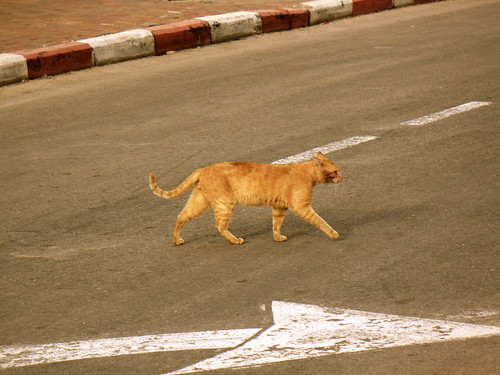
They're everywhere. And they're begging to be the main characters in stories about secret feline societies.
Roadside dog

Her name is Luna. She belongs to a food vendor who's stationed in the Judean Desert, en route to the Dead Sea, at the point on the road marked 'sea level.' (You're traveling from the heights of Jerusalem to the Dead Sea, which is the lowest point on Earth - or at least on dry Earth. Reaching sea level is a milestone along the way.)
Luna is used to strangers, and walked over to everyone to get petted and photographed.

They're everywhere. And they're begging to be the main characters in stories about secret feline societies.
Roadside dog

Her name is Luna. She belongs to a food vendor who's stationed in the Judean Desert, en route to the Dead Sea, at the point on the road marked 'sea level.' (You're traveling from the heights of Jerusalem to the Dead Sea, which is the lowest point on Earth - or at least on dry Earth. Reaching sea level is a milestone along the way.)
Luna is used to strangers, and walked over to everyone to get petted and photographed.
Labels:
animals,
birds,
desert,
Israel,
Masada,
photography,
photos (mine),
travel
Monday, April 27, 2015
Week in Seven Words #253
covert
She's hidden things behind her books - keys to cabinets, necklace pendants, folded letters. She says it's extra protection against casual burglars; they won't rifle through her shelves. But I also suspect it's her romantic streak. She's always wanted the kind of bookcase that would hide a secret, like a door that springs open when you pull out a volume of Donne's poetry.
demolishing
The book I use as a sledgehammer, to smash obstructions in my mind.
ducking
He has always crouched behind a shield. Currently, it's his wife. As long as he's with her, he's protected. No one looks too closely at him.
filling
Strange how the book leaves us both satisfied and empty.
olio
He has in his speech flavors of other countries. He's brimful of anecdotes about bodyguards and bugged hotel rooms, spicy cuisine and off-the-road ruins.
redolence
A begonia in a copper-colored pot, and a cup of orange spice tea.
reversals
Two months earlier, she was fine. Now she has health problems and a career in tailspin through no fault of her own. She speaks in disbelief about her life.
She's hidden things behind her books - keys to cabinets, necklace pendants, folded letters. She says it's extra protection against casual burglars; they won't rifle through her shelves. But I also suspect it's her romantic streak. She's always wanted the kind of bookcase that would hide a secret, like a door that springs open when you pull out a volume of Donne's poetry.
demolishing
The book I use as a sledgehammer, to smash obstructions in my mind.
ducking
He has always crouched behind a shield. Currently, it's his wife. As long as he's with her, he's protected. No one looks too closely at him.
filling
Strange how the book leaves us both satisfied and empty.
olio
He has in his speech flavors of other countries. He's brimful of anecdotes about bodyguards and bugged hotel rooms, spicy cuisine and off-the-road ruins.
redolence
A begonia in a copper-colored pot, and a cup of orange spice tea.
reversals
Two months earlier, she was fine. Now she has health problems and a career in tailspin through no fault of her own. She speaks in disbelief about her life.
Thursday, April 9, 2015
Marian Anderson footage from the Lincoln Memorial
I came across this historical footage recently, of Marian Anderson at the Lincoln Memorial. It's from April 9, 1939.
By 1939, she had already enjoyed much professional success as a singer (of arias and other classical pieces, also spirituals), but in DC she wasn't permitted to give a performance at Constitution Hall, because she was black. So she sang at the Lincoln Memorial. (Here's more background about Anderson and the performance.) The footage here is just a small excerpt from the program.
By 1939, she had already enjoyed much professional success as a singer (of arias and other classical pieces, also spirituals), but in DC she wasn't permitted to give a performance at Constitution Hall, because she was black. So she sang at the Lincoln Memorial. (Here's more background about Anderson and the performance.) The footage here is just a small excerpt from the program.
Labels:
character,
music,
race,
video,
Washington DC
Tuesday, April 7, 2015
Week in Seven Words #252
empty
I work with words, I depend on them, but I can't find the right ones sometimes, not when I need them badly.
glossing
They're good at pretending. They'll bump her along from one grade to the next, while ignoring her anxiety, her disintegrating home, the bullies that wait for her in school corridors. Just as long as she passes, she's ok.
ramus
The tree has gone wild, stabbing its branches into the shingles as if it wants to pry the roof off the house.
replaying
Many parents forget what it was like to be a child. Without knowing it, they use parenthood as a way of re-enacting their own childhood. They might look to their children for what their parents never gave them. They might imitate their own parents and relish the power they finally have.
sweetening
She'll try to buy her way into their affection, or at least their sense of obligation.
tenterhooks
Two parents, a bassinet between them, stare at the doctor. They want more than his words. They want to read what his face gives away.
unravel
A game of Clue that starts with poker-faced "mmm-hmms" and ends with shrieking.
I work with words, I depend on them, but I can't find the right ones sometimes, not when I need them badly.
glossing
They're good at pretending. They'll bump her along from one grade to the next, while ignoring her anxiety, her disintegrating home, the bullies that wait for her in school corridors. Just as long as she passes, she's ok.
ramus
The tree has gone wild, stabbing its branches into the shingles as if it wants to pry the roof off the house.
replaying
Many parents forget what it was like to be a child. Without knowing it, they use parenthood as a way of re-enacting their own childhood. They might look to their children for what their parents never gave them. They might imitate their own parents and relish the power they finally have.
sweetening
She'll try to buy her way into their affection, or at least their sense of obligation.
tenterhooks
Two parents, a bassinet between them, stare at the doctor. They want more than his words. They want to read what his face gives away.
unravel
A game of Clue that starts with poker-faced "mmm-hmms" and ends with shrieking.
Sunday, April 5, 2015
Three Stories with Flowers in Their Titles
Title: At the Time of the Jasmine
Author: Alifa Rifaat
Translator: Denys Johnson-Davies
Where I Read It: The Anchor Book of Modern African Stories
A son goes home to attend his father's funeral. The funeral rituals prompt people to pay their respects regardless of their feelings for the dead. And by serving as the basic steps for what to do, the rituals can act both as a guide through a difficult time and as a means to free people's minds from the details of what they need to do, so that they can consider feelings and questions they've long avoided.
The son had drifted apart from his father. Now he asks himself why. He also considers duty and love. What did his father feel towards him - some mixture of both? At the very least, duty maybe, but perhaps more. What happened to their relationship, and was the son also dutiful to the father? Jasmine - its scent and its significance to father and son - traces its way through the story.
Title: Blue Poppies
Author: Jane Gardam
Where I Read It: The Garden of Reading
Title: Roses, Rhododendron
Author: Alice Adams
Where I Read It: American Voices
I like the sense of place in this one, and the rich details. As a child, Jane Kilgore moves from Boston to North Carolina with her mother, who has taken up selling antiques; Jane's father has abandoned them. After some exploration, Jane finds the home of the girl who will become her childhood best friend: Harriet Farr. Harriet's personal qualities, parents, and home are everything that Jane hopes she could have. Some years later, after Jane moves away, she realizes that she was more important than she could have imagined to Harriet and her family. The story explores the girls' friendship and how they've imprinted themselves on each other - and even years later, after they've moved away from their childhood and from each other, their friendship can linger and show them new things about themselves.
Author: Alifa Rifaat
Translator: Denys Johnson-Davies
Where I Read It: The Anchor Book of Modern African Stories
A son goes home to attend his father's funeral. The funeral rituals prompt people to pay their respects regardless of their feelings for the dead. And by serving as the basic steps for what to do, the rituals can act both as a guide through a difficult time and as a means to free people's minds from the details of what they need to do, so that they can consider feelings and questions they've long avoided.
The son had drifted apart from his father. Now he asks himself why. He also considers duty and love. What did his father feel towards him - some mixture of both? At the very least, duty maybe, but perhaps more. What happened to their relationship, and was the son also dutiful to the father? Jasmine - its scent and its significance to father and son - traces its way through the story.
Title: Blue Poppies
Author: Jane Gardam
Where I Read It: The Garden of Reading
"Mother had been staying with me for a month, sometimes knowing me, sometimes looking interestedly in my direction as if she ought to."A woman and her senile mother seem to talk across each other a lot. She takes her mother to the old estate of a duchess and duke, where there's a field of blue poppies that maybe the mother has visited before but can't remember. Both noble personages are on the scene, though they don't much look the part of nobility; the duchess is gardening, the duke sits outdoors looking forlorn, and they've opened up their home to public visitors to raise money. In the course of the story, the duchess acts both as a force that keeps mother and daughter apart at a critical time, and as a means of giving some awkward, painful closure at the end. It's told with a light touch that still lets darker emotions like grief and regret seep through.
Title: Roses, Rhododendron
Author: Alice Adams
Where I Read It: American Voices
I like the sense of place in this one, and the rich details. As a child, Jane Kilgore moves from Boston to North Carolina with her mother, who has taken up selling antiques; Jane's father has abandoned them. After some exploration, Jane finds the home of the girl who will become her childhood best friend: Harriet Farr. Harriet's personal qualities, parents, and home are everything that Jane hopes she could have. Some years later, after Jane moves away, she realizes that she was more important than she could have imagined to Harriet and her family. The story explores the girls' friendship and how they've imprinted themselves on each other - and even years later, after they've moved away from their childhood and from each other, their friendship can linger and show them new things about themselves.
Thursday, April 2, 2015
Week in Seven Words #251
bits
Floor-to-ceiling windows frame a cityscape that looks like the inside of a computer.
diminished
She used to strike me as formidable in social settings, able to charm anyone and steer a conversation to where she liked. This time she comes across as clumsy and out of her depth, as she cuts into other people's sentences or responds to them with expressionless politeness. I feel bad for her, and wish I had more social graces, to shield her.
permeability
Fiddling with a flute of champagne on the edges of a crowd.
pursuing
Her love of science, combined with her family's alarming medical history, have pushed her towards a career researching cancer.
shamed
On top of the mental illness is the stigma, keeping people from feeling human and connected with others.
sighing
His voice is weary when he greets us, as if he regrets remembering our names.
unsullied
On pristine plates, they present dollops of food - three elegant squares of ravioli, or three hillocks of rice with a spray of vegetables.
Floor-to-ceiling windows frame a cityscape that looks like the inside of a computer.
diminished
She used to strike me as formidable in social settings, able to charm anyone and steer a conversation to where she liked. This time she comes across as clumsy and out of her depth, as she cuts into other people's sentences or responds to them with expressionless politeness. I feel bad for her, and wish I had more social graces, to shield her.
permeability
Fiddling with a flute of champagne on the edges of a crowd.
pursuing
Her love of science, combined with her family's alarming medical history, have pushed her towards a career researching cancer.
shamed
On top of the mental illness is the stigma, keeping people from feeling human and connected with others.
sighing
His voice is weary when he greets us, as if he regrets remembering our names.
unsullied
On pristine plates, they present dollops of food - three elegant squares of ravioli, or three hillocks of rice with a spray of vegetables.
Monday, March 30, 2015
"With our palms cupped like shovels"
Spring is here, so why not enjoy a music video where notes mushroom out of the earth and trees to float in the sky? I've liked this song for a while now.
Labels:
music,
relationships,
renewal,
video
Thursday, March 26, 2015
Week in Seven Words #250
clear-eyed
They prefer being spoken to sincerely, not smothered in pats and hugs and baby talk - a tone-deaf sort of love.
inconsistent
He's wearing a seatbelt, driving at speed limit, and taking his eyes off the road to check sports news on his mobile device.
jarring
He murders an otherwise good presentation with jokes about mental illness. The laughter that ripples through the room is faint and disbelieving.
projectiles
His parents are too polite to discuss the issue publicly, but he's overheard them hash it out at home. He doesn't understand everything they say, but he knows enough to know they'd be embarrassed. He knows how to make the next family get-together more entertaining.
stashed
She's brought paper shopping bags full of winter clothes and toiletries to an elegant restaurant. The waiters pretend not to see any of it poking out from under the tablecloth.
tickling
His small feet thrumming on the back of my car seat.
what-ifs
To what extent would my life have been different had I grown up next door to him? I consider this as we sit on opposite benches and pick at our salads. He might have been an advisor or advocate. Or maybe still too much removed from what was going on. I might not have listened anyway.
They prefer being spoken to sincerely, not smothered in pats and hugs and baby talk - a tone-deaf sort of love.
inconsistent
He's wearing a seatbelt, driving at speed limit, and taking his eyes off the road to check sports news on his mobile device.
jarring
He murders an otherwise good presentation with jokes about mental illness. The laughter that ripples through the room is faint and disbelieving.
projectiles
His parents are too polite to discuss the issue publicly, but he's overheard them hash it out at home. He doesn't understand everything they say, but he knows enough to know they'd be embarrassed. He knows how to make the next family get-together more entertaining.
stashed
She's brought paper shopping bags full of winter clothes and toiletries to an elegant restaurant. The waiters pretend not to see any of it poking out from under the tablecloth.
tickling
His small feet thrumming on the back of my car seat.
what-ifs
To what extent would my life have been different had I grown up next door to him? I consider this as we sit on opposite benches and pick at our salads. He might have been an advisor or advocate. Or maybe still too much removed from what was going on. I might not have listened anyway.
Tuesday, March 17, 2015
Ides of March Hike: Tarrytown to Van Cortlandt Park

This past Sunday, I went on a group hike from Tarrytown, NY to Van Cortlandt Park in the Bronx. The hike more or less followed a segment of the Old Croton Aqueduct Trail.
It wound up being 18.5 miles (the hike leader had initially estimated 16).
It also should have been scheduled a month from now. The trail was in terrible condition - a sludgy mix of snow, ice, and mud that the hike leader hadn't anticipated (at least not to that extent). And I wore boots that were only casually waterproof; they'd keep your feet dry on a walk home from work in the snow, but not on a messy trail for miles, so my feet got soaked early on.
Had I wanted to (and it was very tempting!), I could have dropped off at a few points before the end. We passed through towns with Metro North train stations that can take you back to NYC. But every time I got to one of those towns, I thought, "I've come this far… so…" And admittedly, had I known the hike would be 2.5 miles longer with the same kind of nasty trail conditions to almost the very end, I maybe would have bailed out at the last drop-off (which was around mile 11). Ignorance can help courage along.
Monday, March 16, 2015
Week in Seven Words #249
bruised
Even when discussing happier memories, her eyes have a wounded look. Much of what she's seen, she can't explain and doesn't want to think about.
busied
Pouring tea is her escape from uncomfortable conversation.
grotto
The cobwebbed elegance of the small café. Bats soar among ruby-red plants. A prim little cheesecake bathes in golden light.
land mine
It's startling when during a conversation with a mild-mannered person you stumble on the one topic that brings a savage light to their eyes.
lettered
Confounded by 'which' - is it 'which' or 'wich'?
measured
A slow swirl of his spoon in the coffee, the way planets revolve around the sun.
scapegoat
He screams at the supermarket cashier because the store closed two minutes ago, and now he can't get his groceries. He hollers into the night. The cashier could be a parent, a boss, a lover who's just walked out on him. He stalks away, after promising a harsh review on Yelp.
Even when discussing happier memories, her eyes have a wounded look. Much of what she's seen, she can't explain and doesn't want to think about.
busied
Pouring tea is her escape from uncomfortable conversation.
grotto
The cobwebbed elegance of the small café. Bats soar among ruby-red plants. A prim little cheesecake bathes in golden light.
land mine
It's startling when during a conversation with a mild-mannered person you stumble on the one topic that brings a savage light to their eyes.
lettered
Confounded by 'which' - is it 'which' or 'wich'?
measured
A slow swirl of his spoon in the coffee, the way planets revolve around the sun.
scapegoat
He screams at the supermarket cashier because the store closed two minutes ago, and now he can't get his groceries. He hollers into the night. The cashier could be a parent, a boss, a lover who's just walked out on him. He stalks away, after promising a harsh review on Yelp.
Friday, March 13, 2015
13 short stories for Friday the 13th
I don't believe in the Friday the 13th superstition or that 13 is an unlucky number, but I thought I'd have some fun with today's date (especially because this weekend it's the Ides of March too!).
So here are a bunch of stories that are dark, disturbing, or otherwise strange, exploring fears and tragedies. The characters might be unlucky. They might also work to make themselves unlucky.

So here are a bunch of stories that are dark, disturbing, or otherwise strange, exploring fears and tragedies. The characters might be unlucky. They might also work to make themselves unlucky.

Thursday, March 12, 2015
Week in Seven Words #248
conniption
The wind, fierce and fretful, throws a tantrum among the trees.
expose
The trail overlooks people's backyards. What do they think about the strange hikers who can peer into their windows at any time of day?
glinting
There is sweat on her upper lip, and her smile is blinding. She would prefer if you look at her smile and not at her eyes.
gold-leaf
Leaves and loose rock underfoot. Gold spreading gloriously overhead.
osseous
All that's left of a home: two stone walls, roof tiles littering the ground, a chimney decaying like a tooth.
splashed
The river throws the sunlight off its back and into our eyes.
thoroughfare
Learning the contours of a river from a train, a forest ridge, and two bridges.
The wind, fierce and fretful, throws a tantrum among the trees.
expose
The trail overlooks people's backyards. What do they think about the strange hikers who can peer into their windows at any time of day?
glinting
There is sweat on her upper lip, and her smile is blinding. She would prefer if you look at her smile and not at her eyes.
gold-leaf
Leaves and loose rock underfoot. Gold spreading gloriously overhead.
osseous
All that's left of a home: two stone walls, roof tiles littering the ground, a chimney decaying like a tooth.
splashed
The river throws the sunlight off its back and into our eyes.
thoroughfare
Learning the contours of a river from a train, a forest ridge, and two bridges.
Monday, March 9, 2015
Sunday, March 8, 2015
Week in Seven Words #247
assuaged
The restaurant feels impersonal, all the furniture spare and made of metal, but they serve rich comfort food.
barred
When I see the number of missed calls that have accumulated in my cell phone, I'm glad I kept it on 'silent.' Otherwise, I wouldn't have had the morning to myself, to explore as I like.
enchanting
Plum-colored houses with white picket fences. Cobbled lanes and sunken gardens.
gratifying
Tourists licking ice cream in the salt-flavored air.
singular
A lonely giant on a charcoal ledge looks away from the moon.
soaped
Back-to-back episodes of Shark Tank, the TV flickering in a dark room. My mind gently wiped clean of the day's emotions.
tenacious
His wife strikes me as hard and bright, a woman who's difficult to get to know but worth knowing.
The restaurant feels impersonal, all the furniture spare and made of metal, but they serve rich comfort food.
barred
When I see the number of missed calls that have accumulated in my cell phone, I'm glad I kept it on 'silent.' Otherwise, I wouldn't have had the morning to myself, to explore as I like.
enchanting
Plum-colored houses with white picket fences. Cobbled lanes and sunken gardens.
gratifying
Tourists licking ice cream in the salt-flavored air.
singular
A lonely giant on a charcoal ledge looks away from the moon.
soaped
Back-to-back episodes of Shark Tank, the TV flickering in a dark room. My mind gently wiped clean of the day's emotions.
tenacious
His wife strikes me as hard and bright, a woman who's difficult to get to know but worth knowing.
Labels:
art,
beauty,
Boston,
character,
desserts,
food,
resilience,
restaurants,
Salem,
T.V.,
travel,
week in seven words
Thursday, March 5, 2015
Dragonballs: Harry Potter as a much different movie...
Not only is this funny, it's also a good example of excellent video editing skills.
Labels:
editing,
Harry Potter,
laughter,
music,
video
Week in Seven Words #246
brevity
Head fogged with a light fever, I open the door and hope that, for once, she'll say nothing and leave quickly.
etiolated
His parting emails, echoing an earlier confusion about what he wants and how he means to act in a relationship.
gritty
Pencil shavings in a pink pencil case.
laugh track
They watch the episode again, this time to revisit all the parts they found funny the first time around and see if I'll laugh too.
neural
The fourth and fifth fingers burn with a muffled electricity, as if they're stuffed with poorly insulated wires.
precocity
The persona she adopts to protect herself is the bright girl who doesn't have patience for adult silliness. She knows everything and let's every taunt roll off her. That's what she wants you to believe, so that you don't look more closely at her.
spacey
She writes a sentence, stops, stares at the book spines, forgets how she meant to continue. She crosses out the sentence, begins again, stops, stares at the far wall, the pencil tip wobbling on the lined paper.
Head fogged with a light fever, I open the door and hope that, for once, she'll say nothing and leave quickly.
etiolated
His parting emails, echoing an earlier confusion about what he wants and how he means to act in a relationship.
gritty
Pencil shavings in a pink pencil case.
laugh track
They watch the episode again, this time to revisit all the parts they found funny the first time around and see if I'll laugh too.
neural
The fourth and fifth fingers burn with a muffled electricity, as if they're stuffed with poorly insulated wires.
precocity
The persona she adopts to protect herself is the bright girl who doesn't have patience for adult silliness. She knows everything and let's every taunt roll off her. That's what she wants you to believe, so that you don't look more closely at her.
spacey
She writes a sentence, stops, stares at the book spines, forgets how she meant to continue. She crosses out the sentence, begins again, stops, stares at the far wall, the pencil tip wobbling on the lined paper.
Sunday, March 1, 2015
18 songs that lift my mood

Not all of these are happy, but in one way or another they lift my mood. I've listed them with the preferred performer for each song.
Autumn in New York - Billie Holiday
Black Rat Swing - Precious Bryant
Brave - Sara Bareilles
Dance Me to the End of Love - Madeleine Peyroux
Don't You (Forget About Me) - Simple Minds
Feeling Good - Nina Simone
Goodnight, New York - Vienna Teng
Impossible Dream - Andy Williams
Jumpin' Jack - Big Bad Voodoo Daddy
Kind and Generous - Natalie Merchant
A Little Less Conversation - Elvis Presley
My Funny Valentine - Ella Fitzgerald
Nobody But Me - The Human Beinz
Non, je ne regrette rien - Edith Piaf
On the Sunny Side of the Street - Ella Fitzgerald
The Only Living Boy in New York - Simon & Garfunkel
Tightrope - Janelle Monáe
Upside Down - Paloma Faith
Image credit and license: Wikimedia Commons
Thursday, February 26, 2015
Week in Seven Words #245
found
Sometimes I'll walk somewhere without any particular purpose, and I'll find something I didn't know I needed. In this case, it's a book, and its contents are so relevant to me I spend most of the day carrying it around and peeking into it when I get the chance.
lashed
In a moment of childish temper, a middle-aged woman strikes another older woman on the back. People gasp. She pretends not to notice their dismay, but hurries out soon after, her face tight with the knowledge that no one will ever see her the same way again.
leaping
Light-headed elation as sunset draws the day down.
muffle
Bundled up on the sofa while the clock ticks and traffic murmurs.
patchouli
They're back - the spindly, perfumed twins who dress like they've stepped out of a steampunk novel. The backs of their hands betray their age, but in other ways they're young; they share a seat and adjust each other's hair.
pervade
Feet clad in cold damp tights. A chill seeps through the door.
trickle
Cold rain snaking into the sleeves of my poncho.
Sometimes I'll walk somewhere without any particular purpose, and I'll find something I didn't know I needed. In this case, it's a book, and its contents are so relevant to me I spend most of the day carrying it around and peeking into it when I get the chance.
lashed
In a moment of childish temper, a middle-aged woman strikes another older woman on the back. People gasp. She pretends not to notice their dismay, but hurries out soon after, her face tight with the knowledge that no one will ever see her the same way again.
leaping
Light-headed elation as sunset draws the day down.
muffle
Bundled up on the sofa while the clock ticks and traffic murmurs.
patchouli
They're back - the spindly, perfumed twins who dress like they've stepped out of a steampunk novel. The backs of their hands betray their age, but in other ways they're young; they share a seat and adjust each other's hair.
pervade
Feet clad in cold damp tights. A chill seeps through the door.
trickle
Cold rain snaking into the sleeves of my poncho.
Thursday, February 12, 2015
Four short stories for an unromantic Valentine's Day
Title: How to Talk to Girls at Parties
Author: Neil Gaiman
Where I Read It: Fragile Things
This reads as a twist on the tired idea that men and women are from different planets. Two teenaged boys, one of them shy and the other one more confident, wind up at a party where the girls are literally aliens - intergalactic travelers, countless galaxies in their eyes. One girl is a living poem containing the essence of a people whose planet died. Intimacy can be terrifying, what with the universe we each have in our heads.
Title: Legal Aid
Author: Frank O'Connor
Where I Read It: Legal Fictions
In Ireland, two young people fool around, the girl gets pregnant, the boy is weak-willed, the boy's father objects strenuously to the idea of marriage, and finally it's up to the girl's lawyer to try and resolve the situation out of court where it's made its way in a paternity suit. The story is full of sly humor and spot-on observations about social pressures and people's petty foolishness. It also compares people's messy actions and motives to the tidy narratives they try to spin in court - where they become 2D figures (paragons or fiends) in a staged drama that has little to do with justice. One lawyer has to choose either to destroy his target in court the way he's been paid to do or to recognize her humanity and the all around fragility and shabbiness of the situation.
Title: Liars in Love
Author: Richard Yates
Where I Read It: The Granta Book of the American Short Story
Love in this story is a temporary word, used when convenient to express a short-lived need. Play-acting at love is a way to fight off loneliness. The main character is on a scholarship in England and on his own for a while. He acts like someone else and steps into a life that isn't his. It's an intense but hollow fiction. And if he can express love as a lie so neatly during this brief, unusual interlude, what does it say about his feelings the rest of the time when he's back in his "real life?" Throughout the story, there's the sense of people engaging in the mechanics of a relationship (sex, cohabitation, meeting the partner's family), but without real intimacy. They clutch at each other for a while and remain lonely.
Title: The Littoral Zone
Author: Andrea Barrett
Where I Read It: American Short Stories Since 1945
Two scientists studying marine life have an affair. Both are married. When they're apart from their families, their relationship makes sense to them, and they think it's worth the betrayals and upheaval. But what will they discover about themselves, years later? What made sense at one point in their lives might no longer apply, and what they live on now are stories they tell to try to justify and redeem what they've lost.
In oceanography, the term 'littoral zone' refers to the part of the ocean nearest the shore (it also sounds erogenous). It's an unsteady place, subject to currents, winds, the tide, the shape of the shoreline and other sources of influence. Creatures that thought they'd learned to thrive there might find themselves gasping on dry land or thrashing around in unexpected turbulence. To keep living, they need to adapt, even if circumstances are now less favorable than they were before. To survive, they can't turn on each other. The stories they tell regulate the tension in their relationship and preserve a certain environment that allows them to both keep breathing.
Author: Neil Gaiman
Where I Read It: Fragile Things
This reads as a twist on the tired idea that men and women are from different planets. Two teenaged boys, one of them shy and the other one more confident, wind up at a party where the girls are literally aliens - intergalactic travelers, countless galaxies in their eyes. One girl is a living poem containing the essence of a people whose planet died. Intimacy can be terrifying, what with the universe we each have in our heads.
Title: Legal Aid
Author: Frank O'Connor
Where I Read It: Legal Fictions
In Ireland, two young people fool around, the girl gets pregnant, the boy is weak-willed, the boy's father objects strenuously to the idea of marriage, and finally it's up to the girl's lawyer to try and resolve the situation out of court where it's made its way in a paternity suit. The story is full of sly humor and spot-on observations about social pressures and people's petty foolishness. It also compares people's messy actions and motives to the tidy narratives they try to spin in court - where they become 2D figures (paragons or fiends) in a staged drama that has little to do with justice. One lawyer has to choose either to destroy his target in court the way he's been paid to do or to recognize her humanity and the all around fragility and shabbiness of the situation.
Title: Liars in Love
Author: Richard Yates
Where I Read It: The Granta Book of the American Short Story
Love in this story is a temporary word, used when convenient to express a short-lived need. Play-acting at love is a way to fight off loneliness. The main character is on a scholarship in England and on his own for a while. He acts like someone else and steps into a life that isn't his. It's an intense but hollow fiction. And if he can express love as a lie so neatly during this brief, unusual interlude, what does it say about his feelings the rest of the time when he's back in his "real life?" Throughout the story, there's the sense of people engaging in the mechanics of a relationship (sex, cohabitation, meeting the partner's family), but without real intimacy. They clutch at each other for a while and remain lonely.
Title: The Littoral Zone
Author: Andrea Barrett
Where I Read It: American Short Stories Since 1945
Two scientists studying marine life have an affair. Both are married. When they're apart from their families, their relationship makes sense to them, and they think it's worth the betrayals and upheaval. But what will they discover about themselves, years later? What made sense at one point in their lives might no longer apply, and what they live on now are stories they tell to try to justify and redeem what they've lost.
In oceanography, the term 'littoral zone' refers to the part of the ocean nearest the shore (it also sounds erogenous). It's an unsteady place, subject to currents, winds, the tide, the shape of the shoreline and other sources of influence. Creatures that thought they'd learned to thrive there might find themselves gasping on dry land or thrashing around in unexpected turbulence. To keep living, they need to adapt, even if circumstances are now less favorable than they were before. To survive, they can't turn on each other. The stories they tell regulate the tension in their relationship and preserve a certain environment that allows them to both keep breathing.
Friday, February 6, 2015
Week in Seven Words #244
arresting
There are some sounds to which I fall silent and still.
present
The key is to appear clearly to yourself and think, "Here I am. Here's what I'm doing." And not have to shy away from either.
pretense
He makes the "both sides are wrong" copout. Yes, both sides have flaws - but for one side, it's a few typos, while for the other side it's the equivalent of ungrammatical chicken scratch handed in on toilet paper.
ribs
I'm imprisoned in the stories I tell about myself.
soggy
Rain puddling under a bench where we sit and share a bag of peanut butter cups.
soreness
Damp and tired, feet chafed, after a long walk in the park with inappropriate footwear.
version
Change the narratives then. Cobble together some new ones. Find out who you are after years of not listening, of treating yourself as second-rate.
There are some sounds to which I fall silent and still.
present
The key is to appear clearly to yourself and think, "Here I am. Here's what I'm doing." And not have to shy away from either.
pretense
He makes the "both sides are wrong" copout. Yes, both sides have flaws - but for one side, it's a few typos, while for the other side it's the equivalent of ungrammatical chicken scratch handed in on toilet paper.
ribs
I'm imprisoned in the stories I tell about myself.
soggy
Rain puddling under a bench where we sit and share a bag of peanut butter cups.
soreness
Damp and tired, feet chafed, after a long walk in the park with inappropriate footwear.
version
Change the narratives then. Cobble together some new ones. Find out who you are after years of not listening, of treating yourself as second-rate.
Wednesday, February 4, 2015
Why my digital avatar is a tree

Trees might not appear to move or change much, but they're teeming with life, inside and out, and changing all the time. Sometimes in obvious ways, other times in secret - the roots spreading underground, the life circulating under the stiff bark.
The roots can penetrate deeper and travel wider than expected, picking their way through soil and rocks, away from the light.
At the same time they spread towards the light.
They are steady and can possess great resilience. They might take on surprising forms, and reveal their beauty and usefulness in unexpected ways.
They are always dancing.

Why did I post this today? It's Tu B'Shevat, the New Year for trees in Judaism.
Labels:
Judaism,
photography,
photos (mine),
self,
trees
Monday, February 2, 2015
Week in Seven Words #243
collected
I love her look - black jeans, black blouse and vest, a fedora on springy curls of hair. An attitude of cool self-possession.
enticingly
A bright warren of books and tables for two.
seitan
Sometimes it's meat-like and meat-flavored. Other times it's like a rubber ball sliced up and well-seasoned.
spongy
What's left of the plant is brown, sponge-like matter crumbling on a sunny window.
streamers
The paintbrush releases ribbons of color into the water.
trending
She has the look of someone who works in a social media company. Sleek and tan, her nimble fingers dancing across a tablet. Like a creature sprung fully grown from an iPhone.
viscid
Green pulpy whirly gunk in a blender.
I love her look - black jeans, black blouse and vest, a fedora on springy curls of hair. An attitude of cool self-possession.
enticingly
A bright warren of books and tables for two.
seitan
Sometimes it's meat-like and meat-flavored. Other times it's like a rubber ball sliced up and well-seasoned.
spongy
What's left of the plant is brown, sponge-like matter crumbling on a sunny window.
streamers
The paintbrush releases ribbons of color into the water.
trending
She has the look of someone who works in a social media company. Sleek and tan, her nimble fingers dancing across a tablet. Like a creature sprung fully grown from an iPhone.
viscid
Green pulpy whirly gunk in a blender.
Labels:
books,
clothing,
food,
painting,
social media,
style,
week in seven words
Subscribe to:
Posts (Atom)




